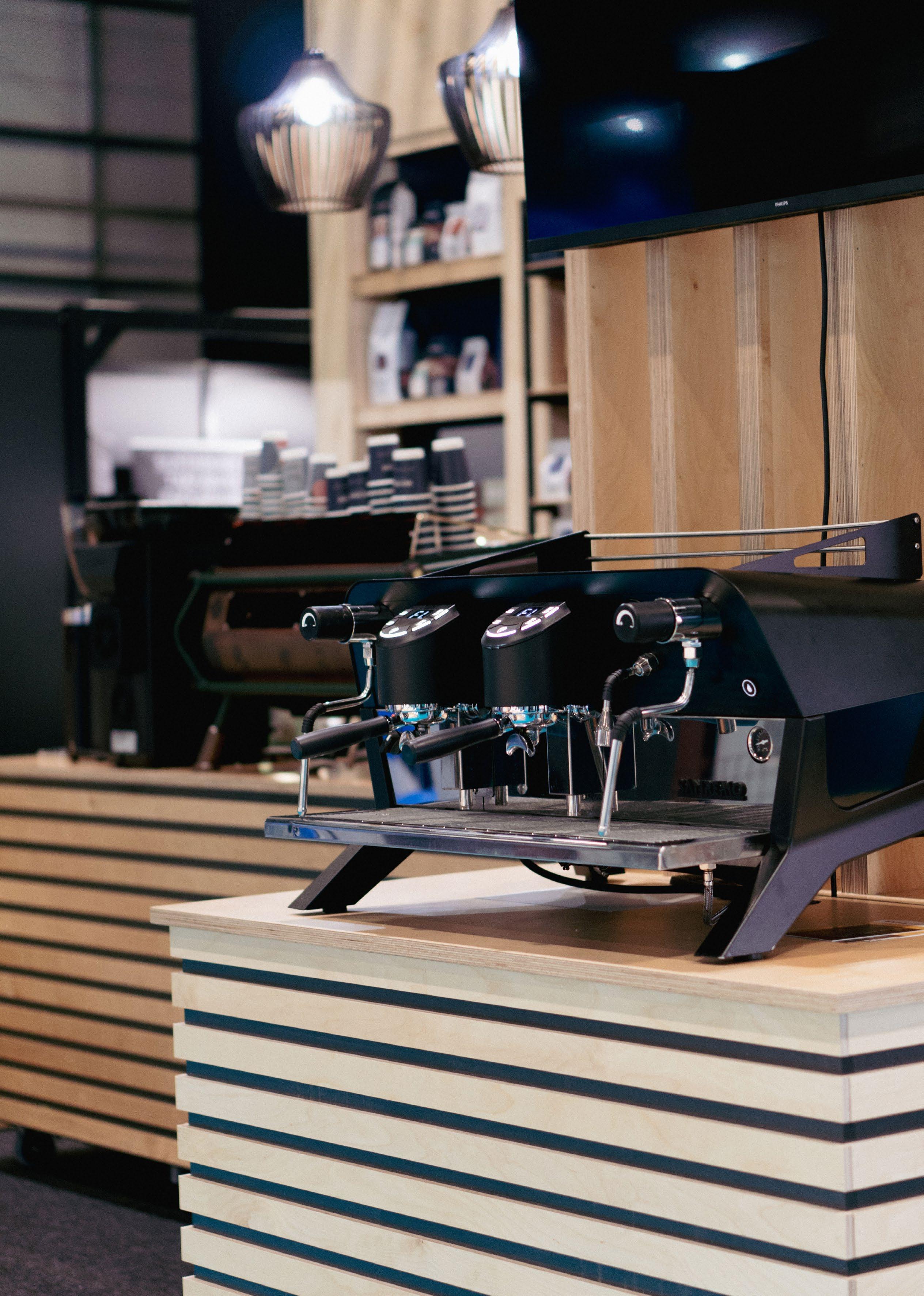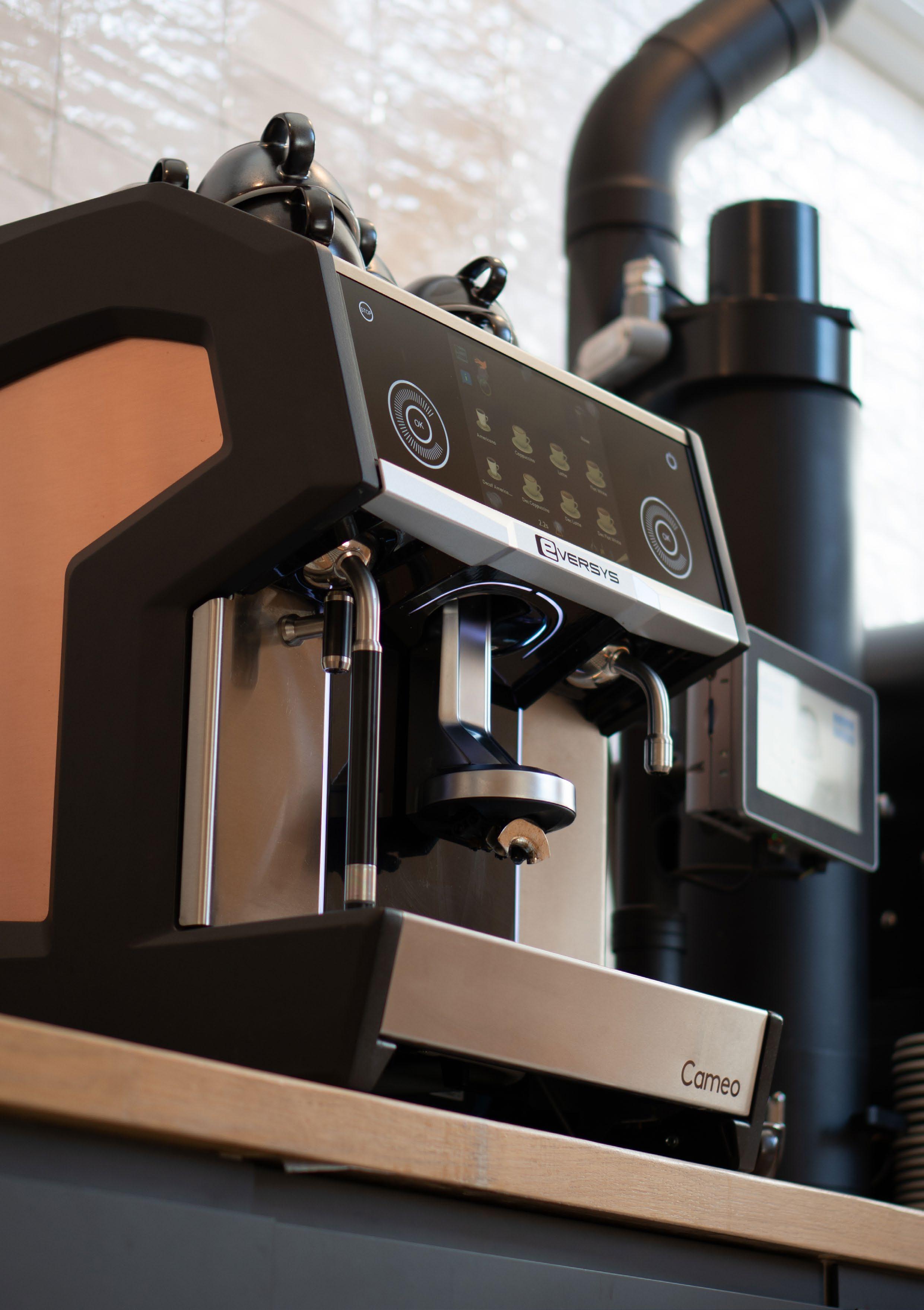
THE FOOD AND BEVERAGE MANAGER’S GUIDE TO BUYING A COFFEE MACHINE






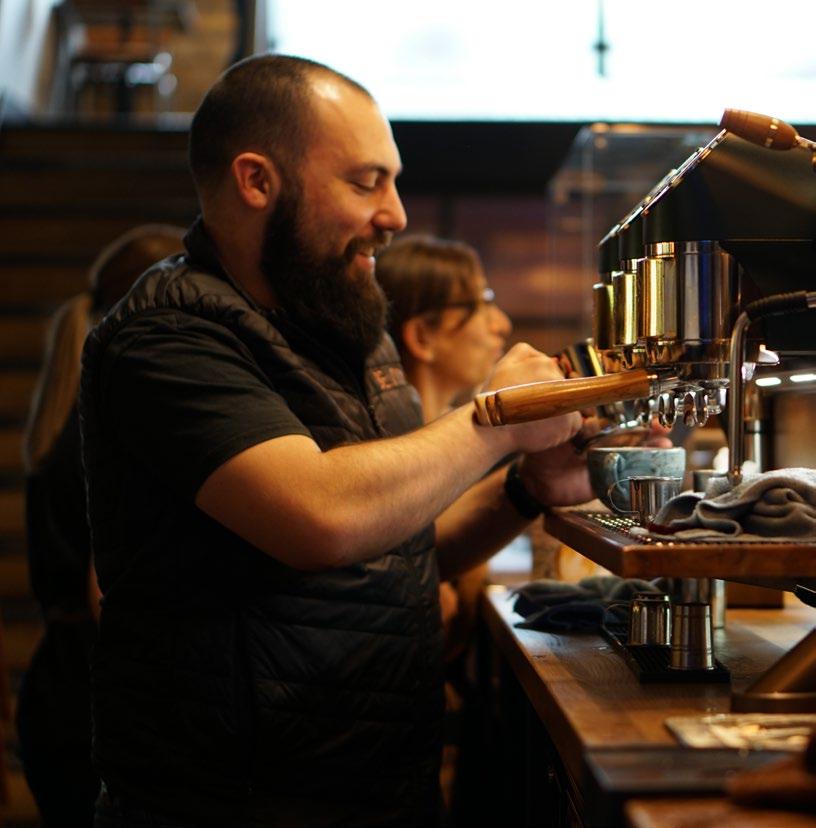
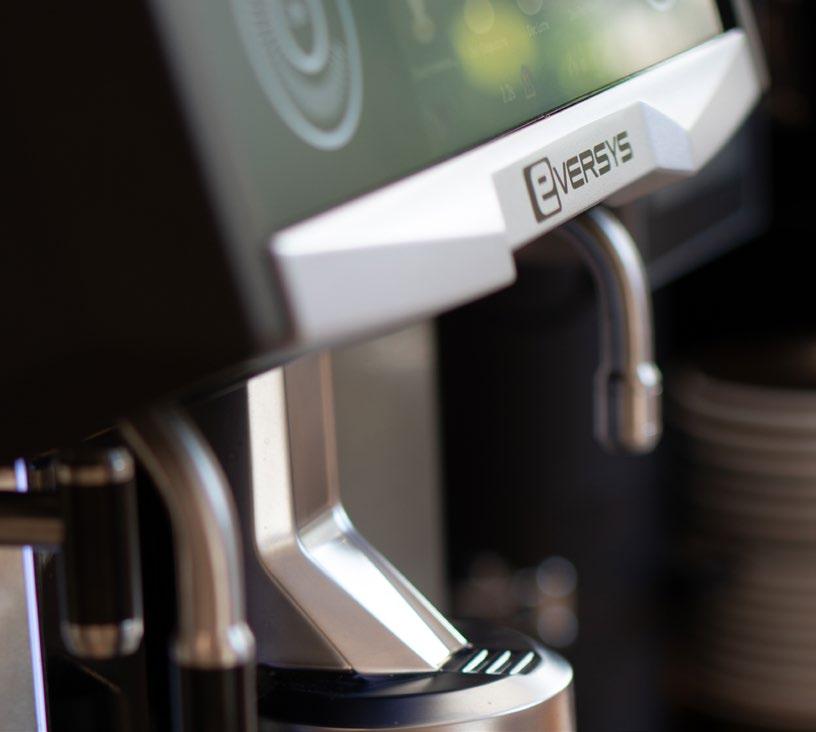
As a food and beverage industry expert, you know how important it is to have the right tools for the job. For businesses offering coffee as part of their service and product line, choosing the right coffee machine can help you elevate your guest experience, whether it’s through barista crafted, customisable coffees, or a simpler selection of quality bean-to-cup brews.
Equally, the wrong coffee machine can cause unnecessary headaches and harm your brand.
But, with so many coffee machines on the market and no-end of industry jargon, knowing what to look for can feel overwhelming. Here at Bridge Coffee Roasters, we understand the importance of getting the right machine for your specific needs.
We’ve been supporting business leaders like yourself in selecting the right coffee machine since 1985, and pride ourselves on preparing our customers for long-term growth by providing smart, tailored business advice.
This eBook cuts through the noise to provide you with a clear understanding of the different types of commercial coffee machines available. After reading, you’ll know exactly which type of machine best suits your needs, along with understanding the key considerations you need to take into account during your decision.
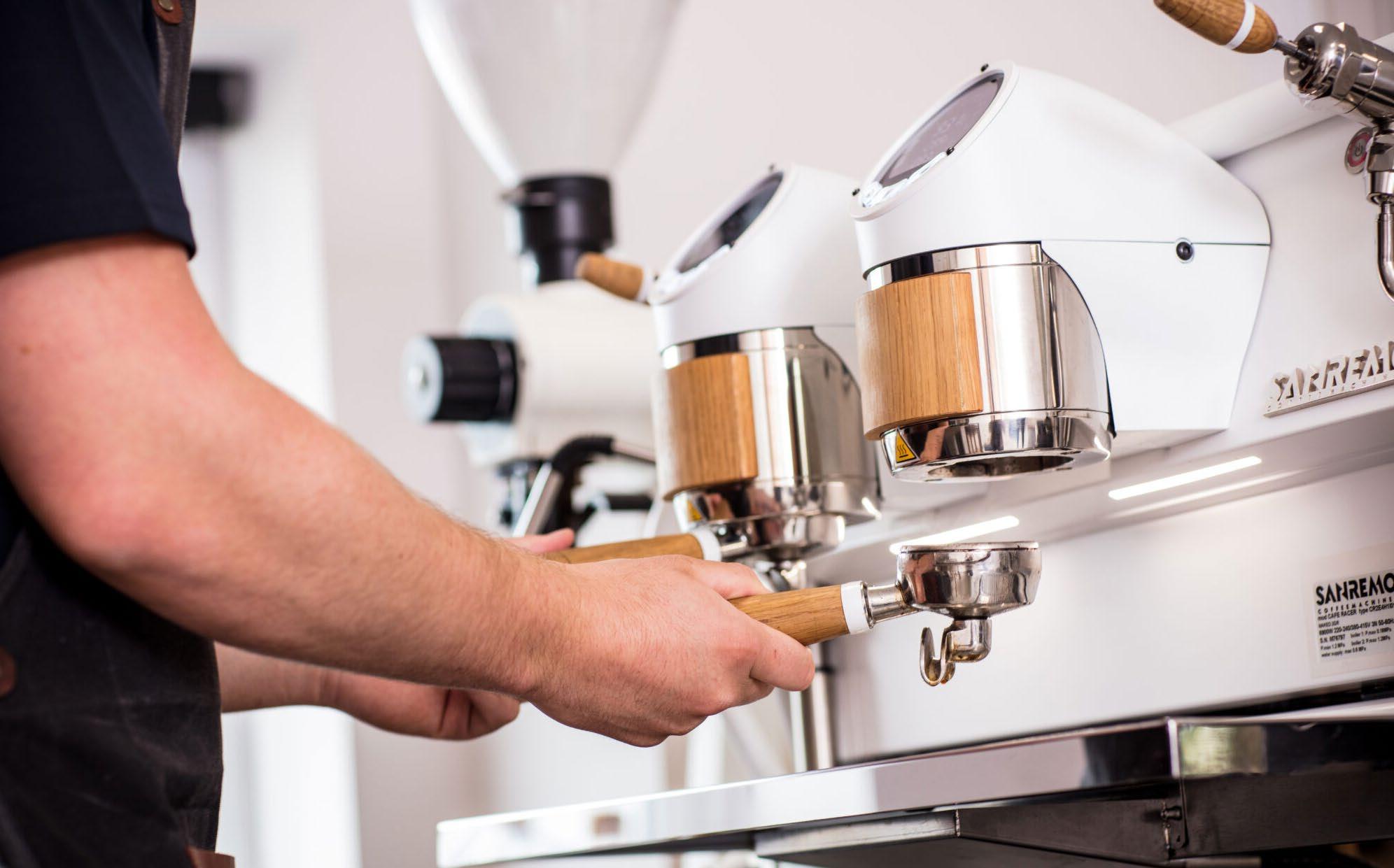
Before we get into the nitty gritty of different models, specifications, optional extras and funky colours, you first need to decide which type of commercial coffee machine is going to be a good fit for your business.
In this section you’ll learn about the differences between the main categories of coffee machine you can invest in, including:
• Traditional espresso
• Bean-to-cup
• Super automatic espresso
Filter coffee machines
Keep in mind, many businesses may be best served by a combination of different coffee machine types around their outlets. For example, a hotel might require a traditional espresso machine for the cafe/bar, a filter coffee machine for breakfast service, pod machines in the bedrooms and a bean-tocup machine in the conference room.
Making sure to choose the right machine for the job is absolutely key. So, here’s an overview of the different types of coffee machines available to you…
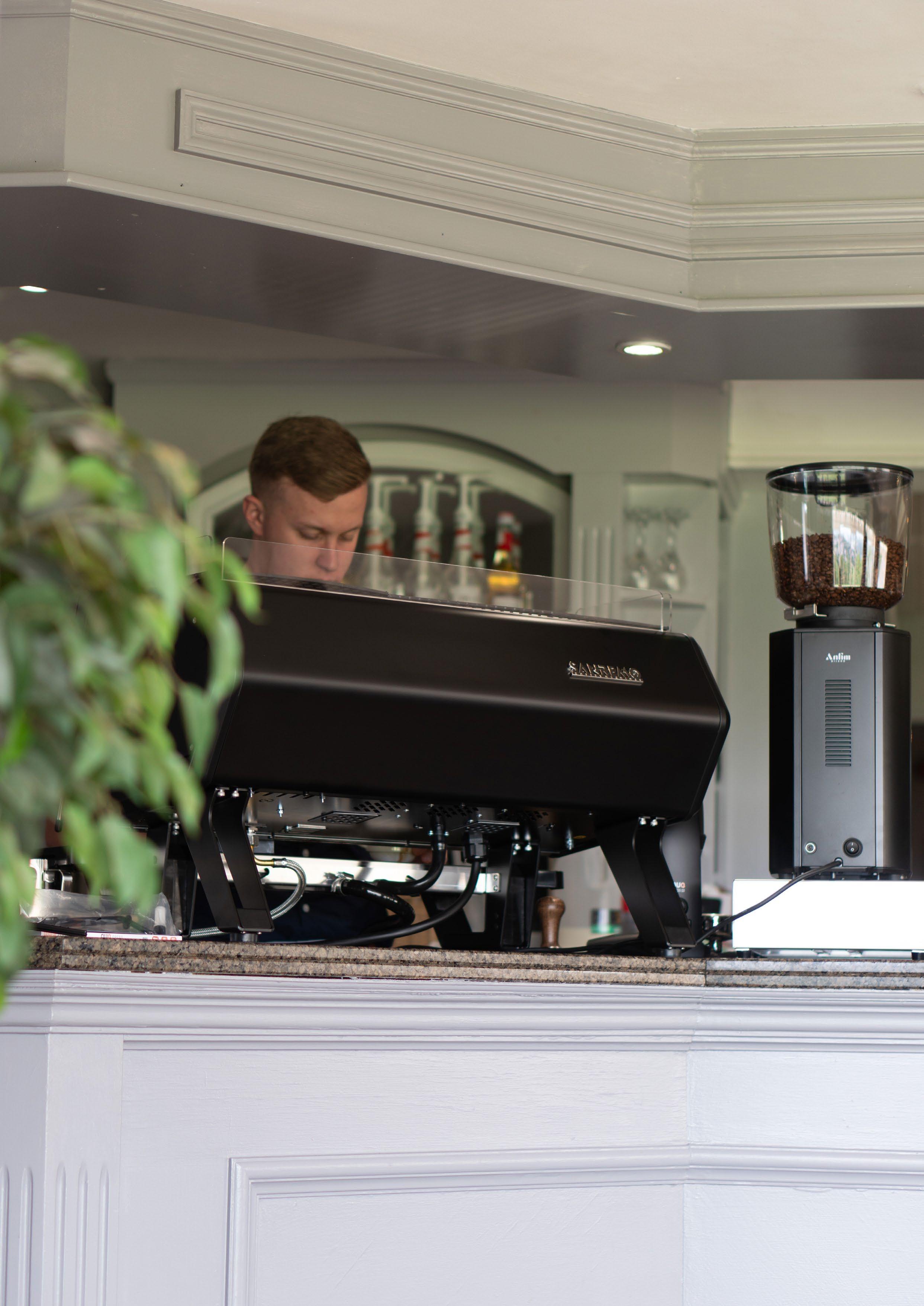
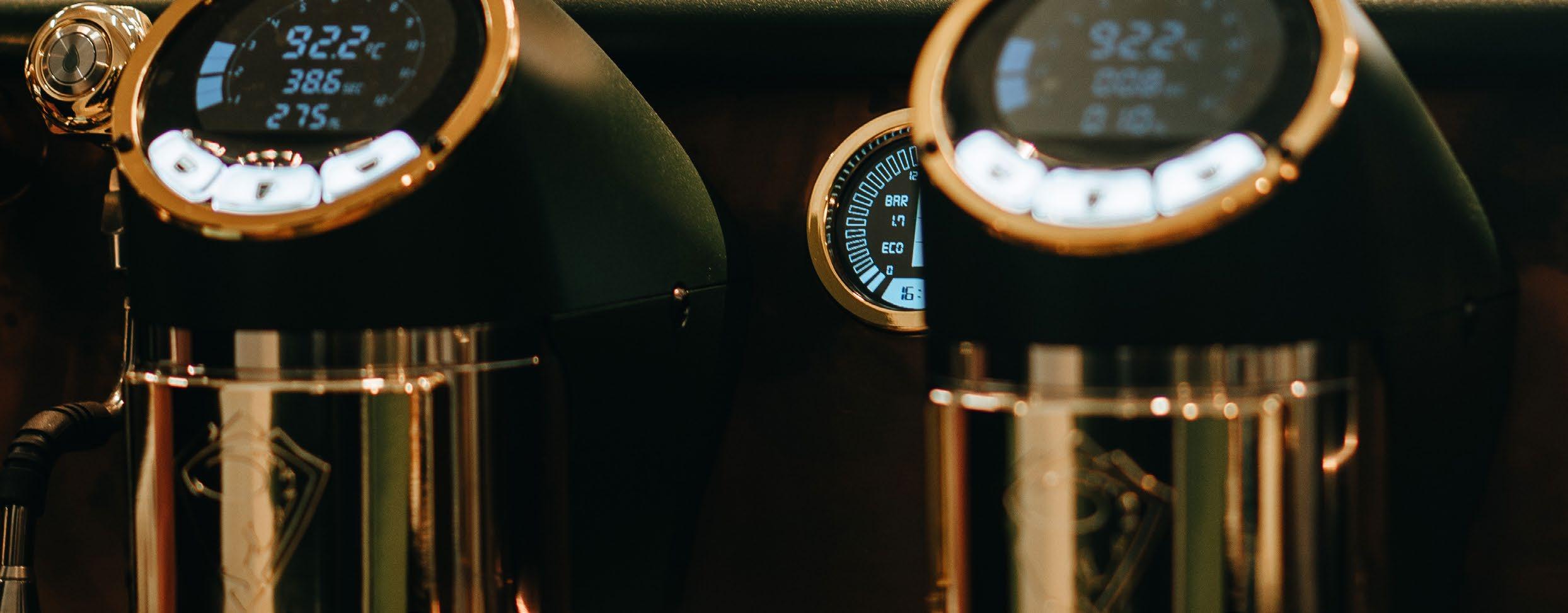
Traditional espresso machines are the gold standard for coffee shops and cafés wanting to serve highquality espresso-based drinks. These machines require finely ground coffee, brewed under pressure to create a rich and concentrated espresso. From there, baristas can craft a variety of drinks, such as cappuccinos, lattes, and flat whites.
Pros:
• Highest Coffee Quality: Traditional espresso machines are revered for their ability to produce top-tier coffee, with a depth of flavour and aroma that’s hard to beat.
• Ultimate Control: These machines allow for significant customisation, letting skilled baristas tweak every aspect of the brewing process.
• High Capacity: Designed to handle high volumes, these machines are ideal for busy establishments.
• Long Lifespan: With proper maintenance, traditional espresso machines are durable enough to last a lifetime with low ongoing costs.
• Variety of Options: There are machines available at various price points, making it easier to find one that fits your budget.
Cons:
• Requires Skilled Baristas: These machines demand a certain level of expertise, which might necessitate additional training for your staff.
• Steep Learning Curve: It can take time for staff to become proficient in using these machines.
• Additional Tools Needed: An external grinder and other barista tools are essential, adding to the initial setup costs.
• Space Requirements: Traditional espresso machines can be bulky, requiring significant counter space.
If your business prides itself on delivering high-quality, customisable coffee experiences and you have skilled baristas, a traditional espresso machine is likely your best option. It’s perfect for cafés, speciality coffee shops, and any establishment where coffee quality is going to be a key part of your service and brand.
Why They Might Not Be for You:
If you don’t have the resources to train up a skilled team of baristas, or you simply need a machine that is easy to use by staff or self-serve, a traditional espresso machine might not be the best fit for you.
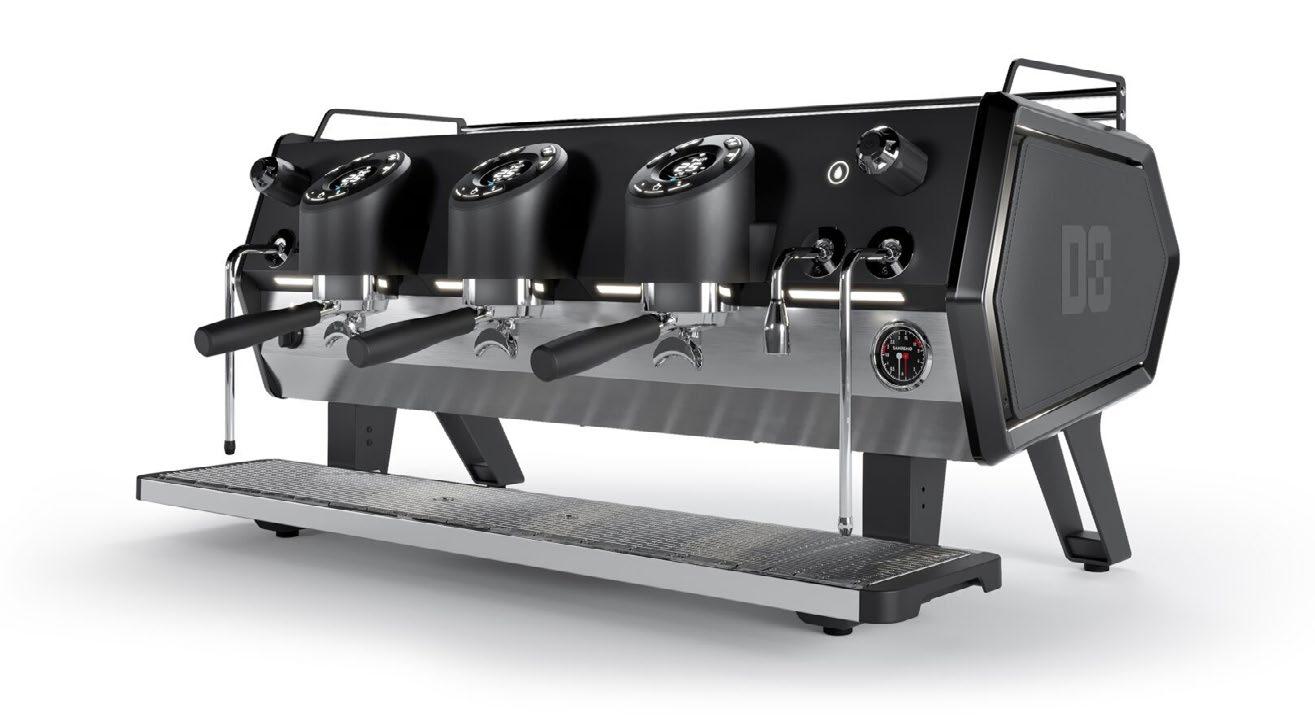
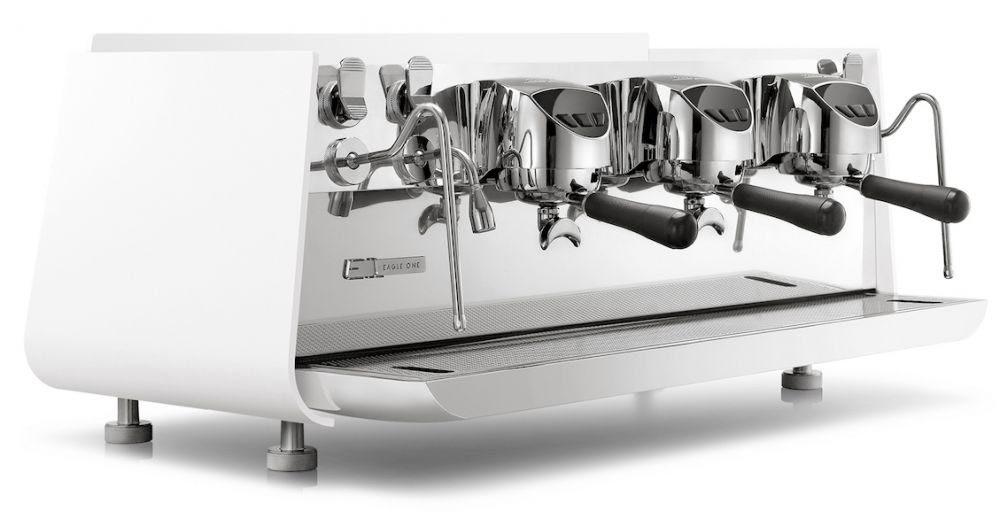
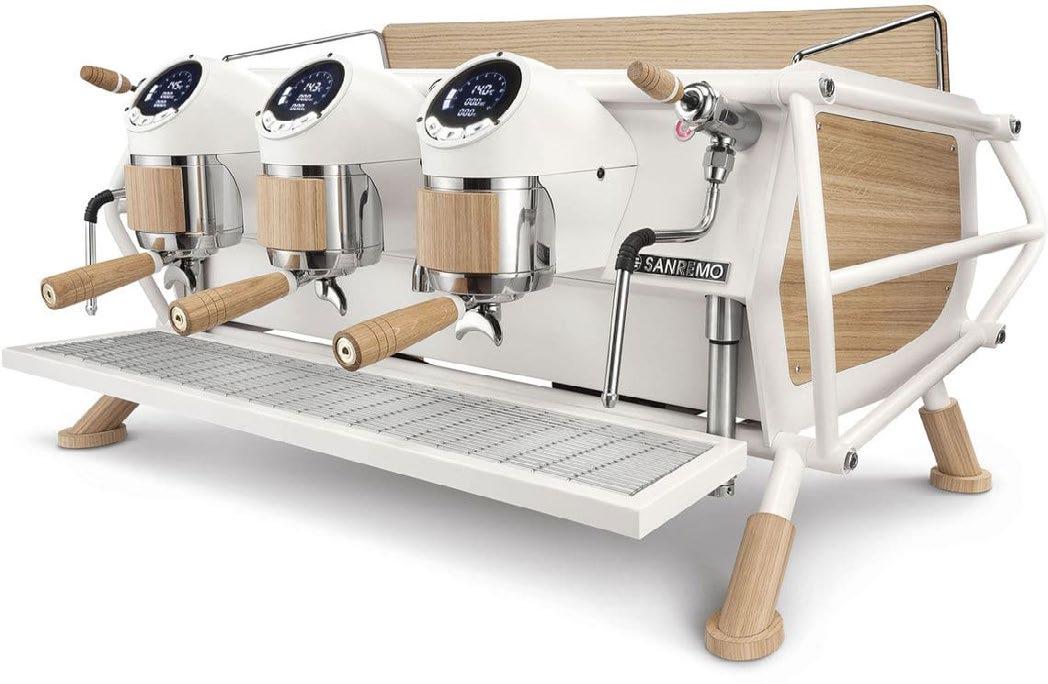
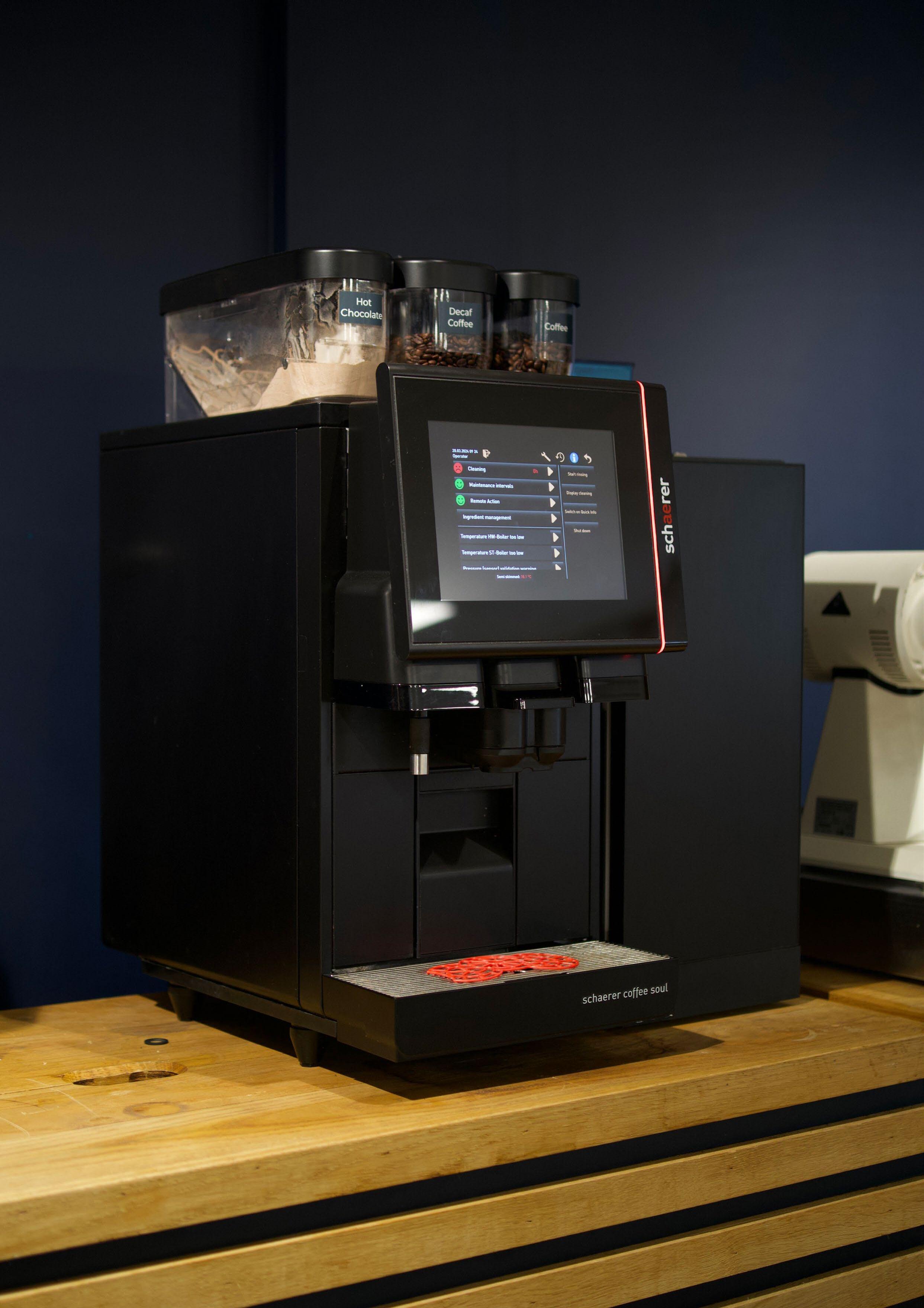
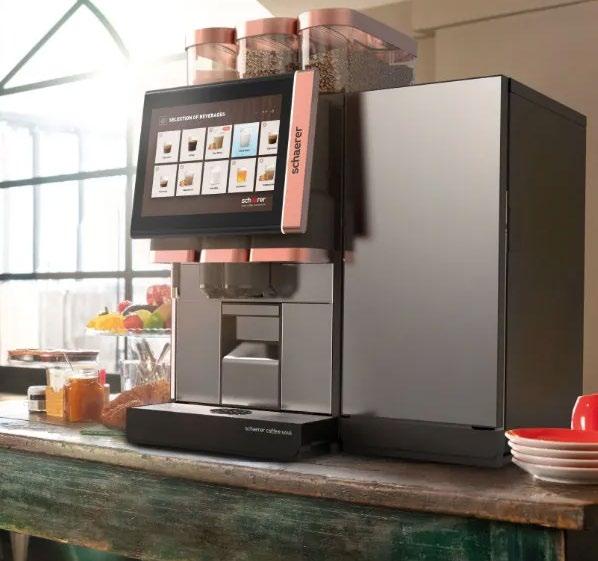
for businesses that value efficiency and reliability.
• Versatile: They offer a variety of drink options, including espresso, cappuccino, and latte, often with the ability to handle both dairy and non-dairy milks.
When
• Lower Capacity: Typically, these machines don’t handle as many drinks per hour as traditional espresso machines.
• Higher Maintenance Costs: Specialist technicians are often required for repairs and maintenance.
Bean-to-cup machines are ideal for coffee outlets or self-serve areas where ease of use and consistency are more important than customisation and high-end coffee experiences, such as in offices, hotels, or conference centres.
They Might Be Your Best Choice: Why They Might Not Be for You:
If you prioritise coffee quality and the ability to customise drinks for your customers, along with being able to provide a high level of service and a sense of craft, you might find bean-to-cup machines too limiting.
Click on the machines to learn more about them
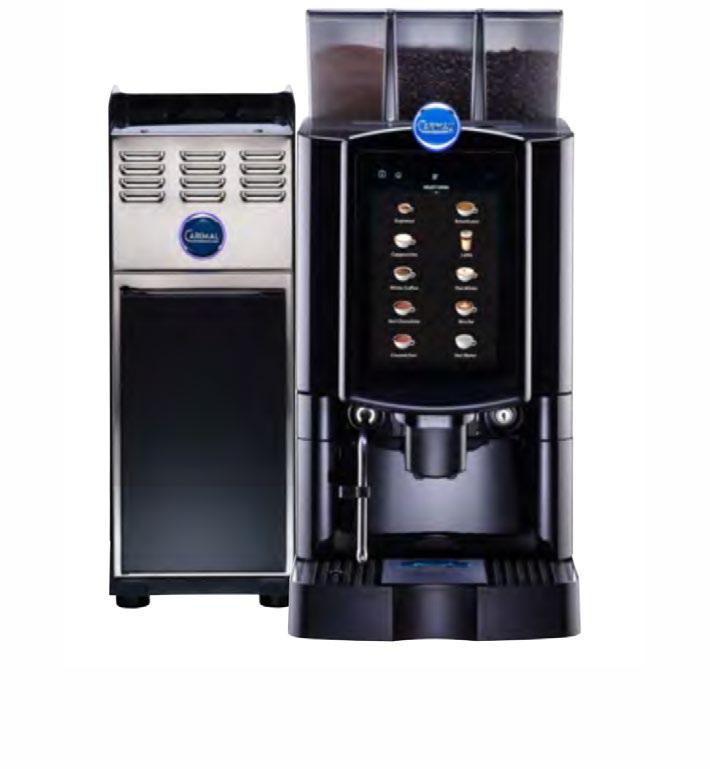
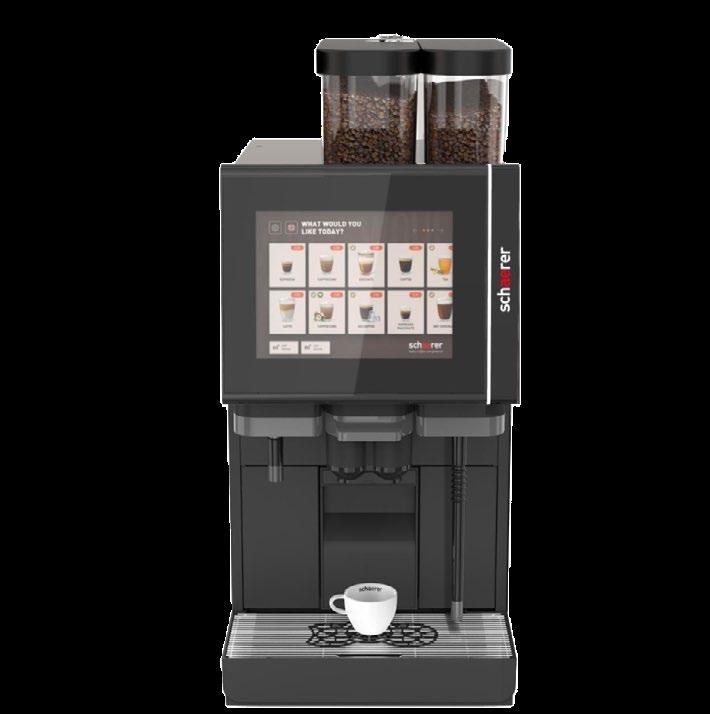
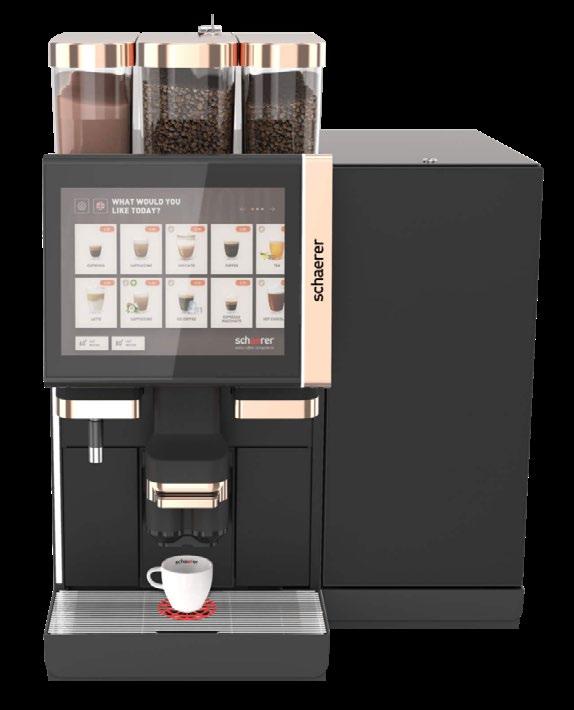
Click on machinesthe to learn more
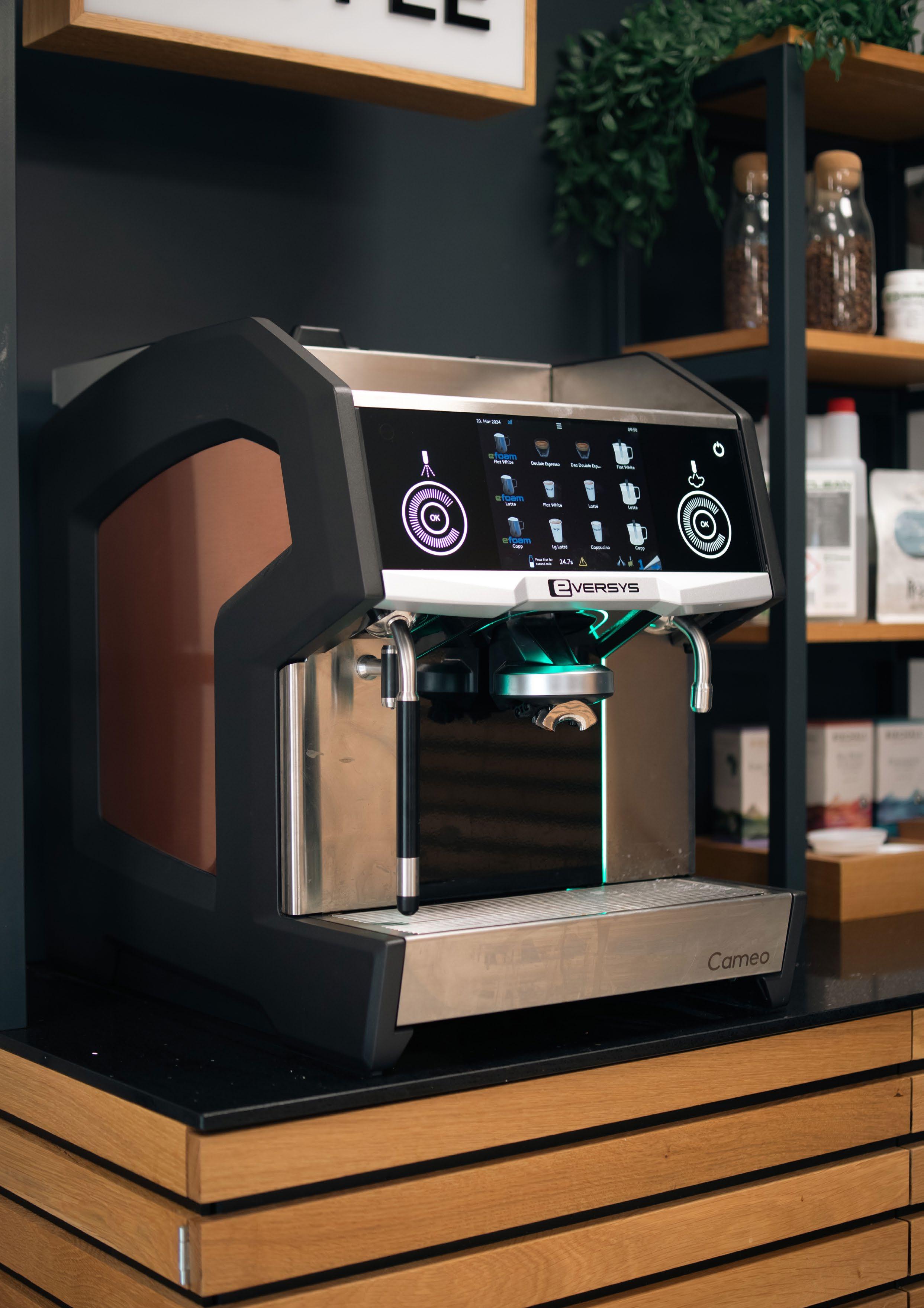
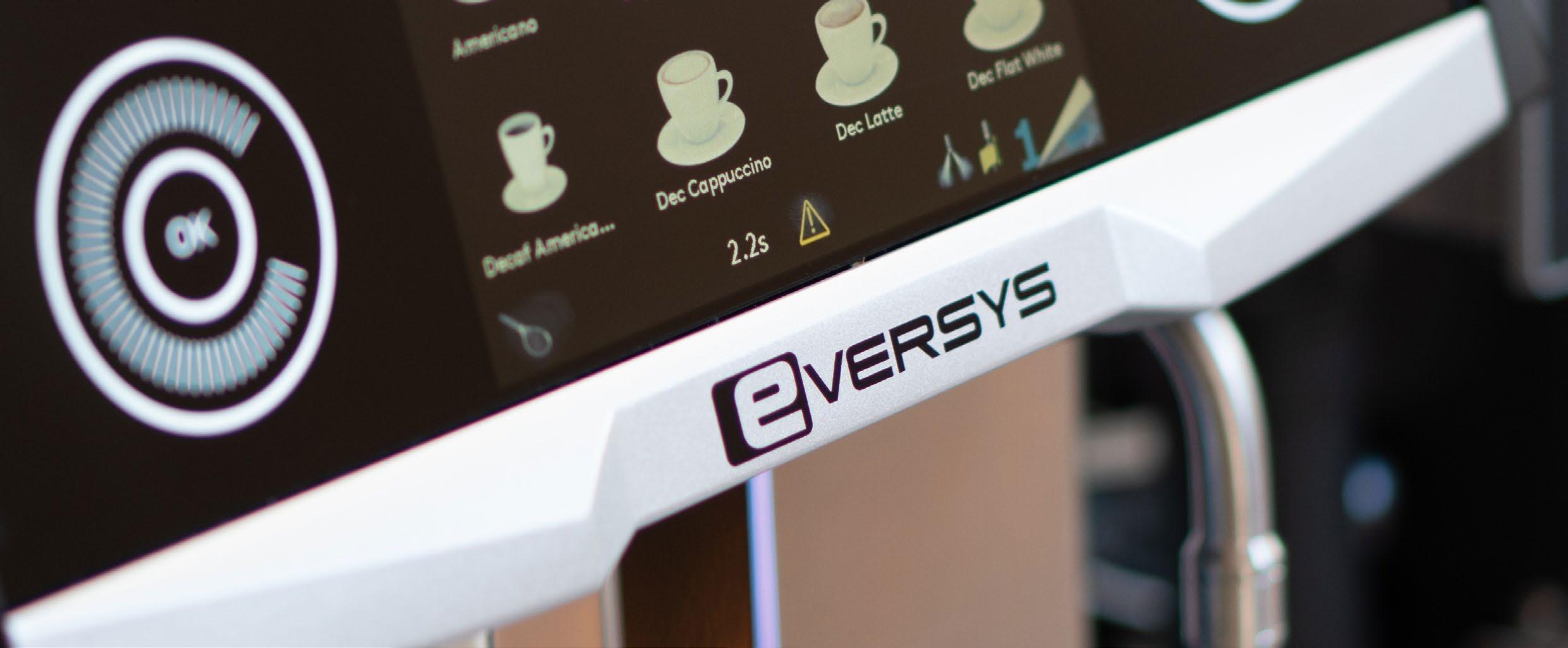
Super automatic machines represent the pinnacle of coffee-making technology, blending the convenience of bean-to-cup machines with the quality and precision of traditional espresso machines. These premium machines handle everything from grinding the beans to steaming the milk, often with advanced features like automatic milk frothing and self-cleaning functions.
Pros:
• Barista-Quality Drinks: Super automatics are designed to produce high-quality espresso and milk-based drinks, often rivalling those made by skilled baristas.
• Ease of Use: With automation taking care of every step, these machines are incredibly user-friendly, making them suitable for both self-serve environments and staff-operated settings.
• High Capacity: These machines are built to handle high volumes, making them ideal for busy locations.
• Consistent Quality: Advanced technology ensures that every cup meets high standards, with minimal variation in taste and quality.
• Automatic Cleaning: Many super automatic machines come with self-cleaning features, reducing the time and effort required for maintenance and increasing lifespan.
Cons:
• High Initial Investment: The advanced technology and capabilities of these machines come with a higher price tag, which might be a significant upfront cost.
• Less Customisation: While they offer excellent consistency, super automatics can limit the ability to fine-tune drinks, which might not satisfy businesses looking for the ultimate in drink customisation.
• Large Footprint: These machines can be quite large, requiring ample counter space.
Super automatic machines are ideal for businesses that want to offer high-quality coffee with minimal effort. They are perfect for settings where consistency, speed, and ease of use are priorities, such as large cafés, hotels, and corporate environments.
Why
If your business model relies heavily on customisation and the craft of coffee-making, a super automatic machine may feel too automated and might not align with your brand’s ethos.
Click on the machines to learn more about them
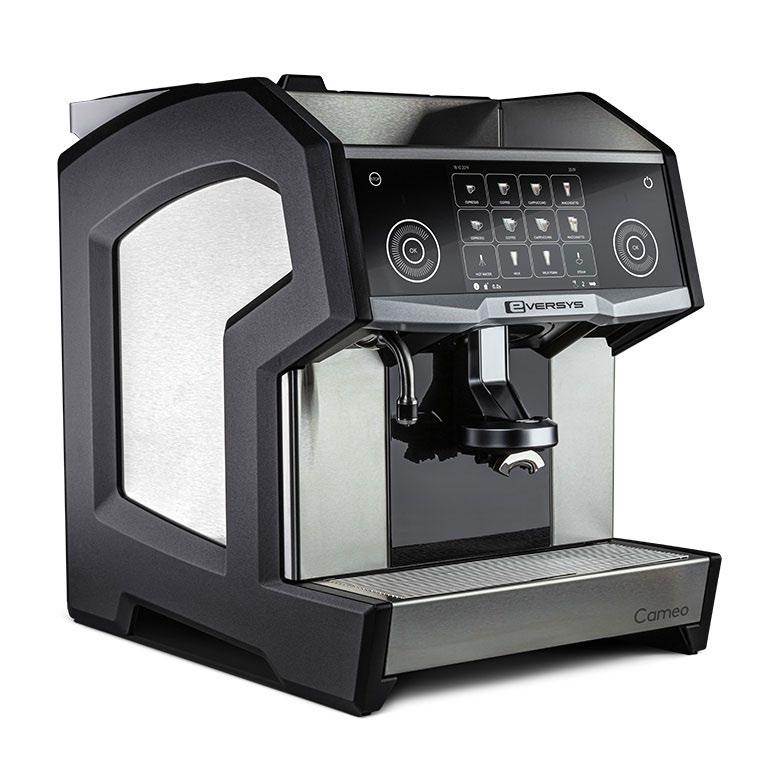
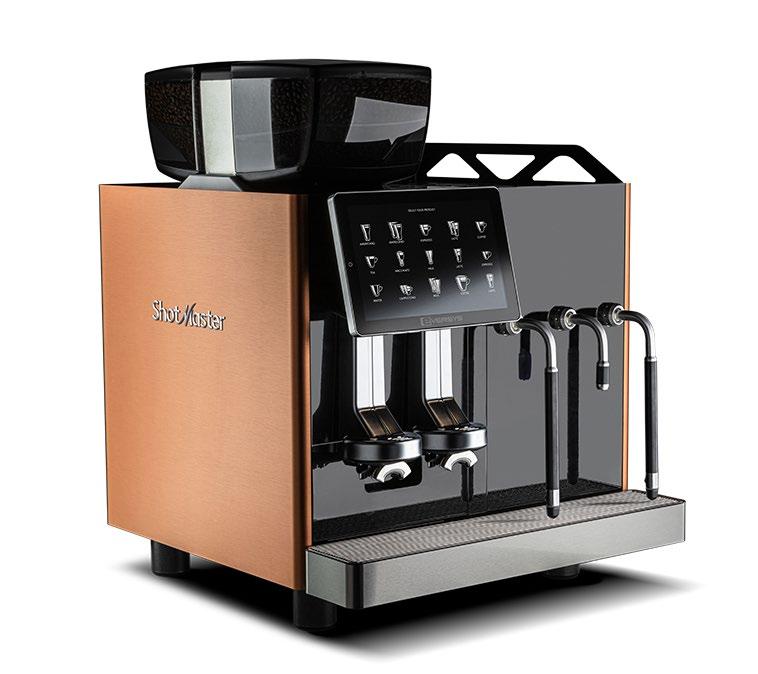
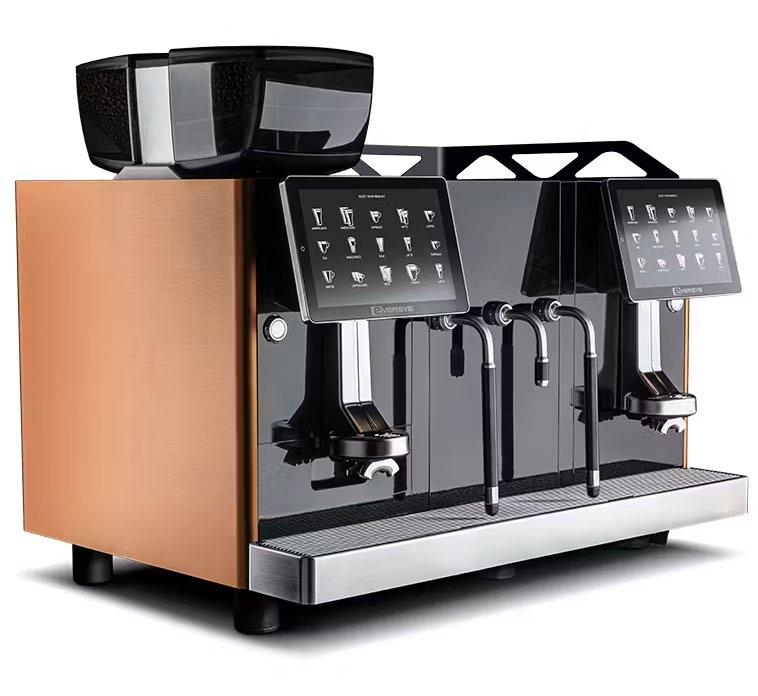
Click on machinesthe to learn more
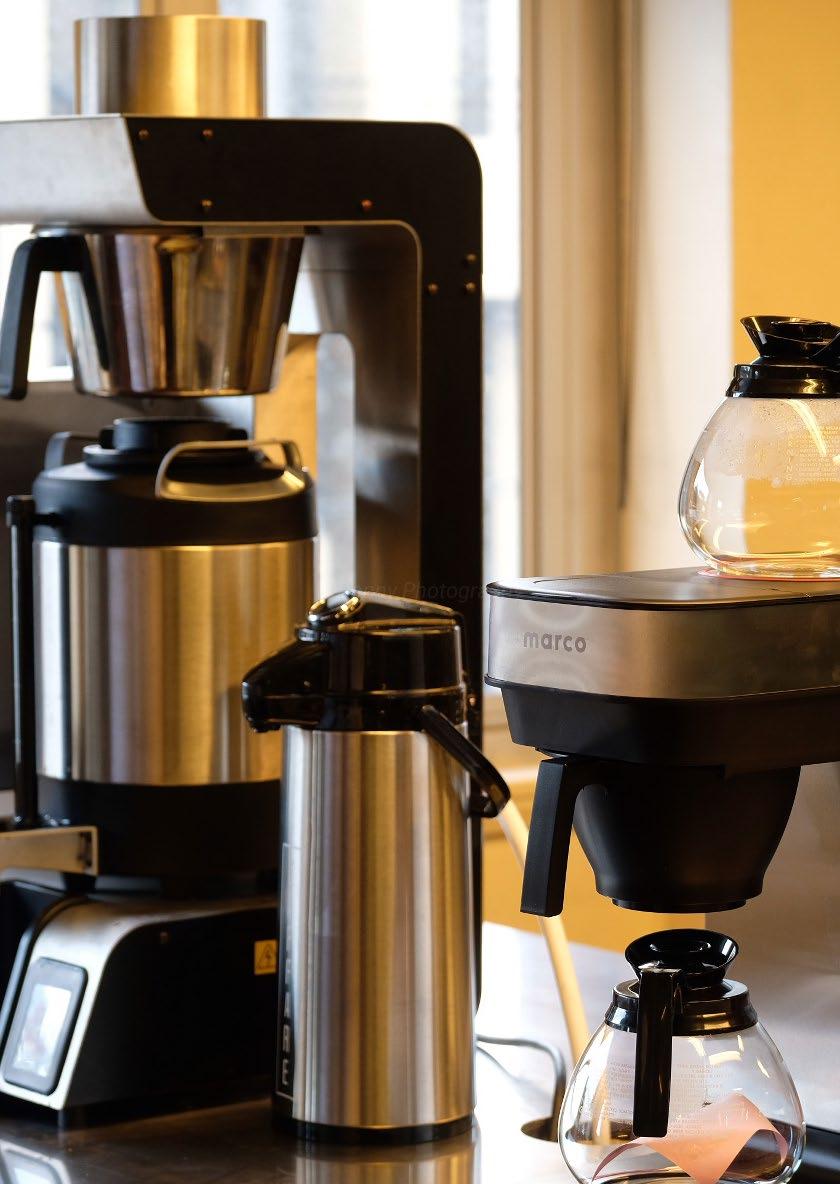
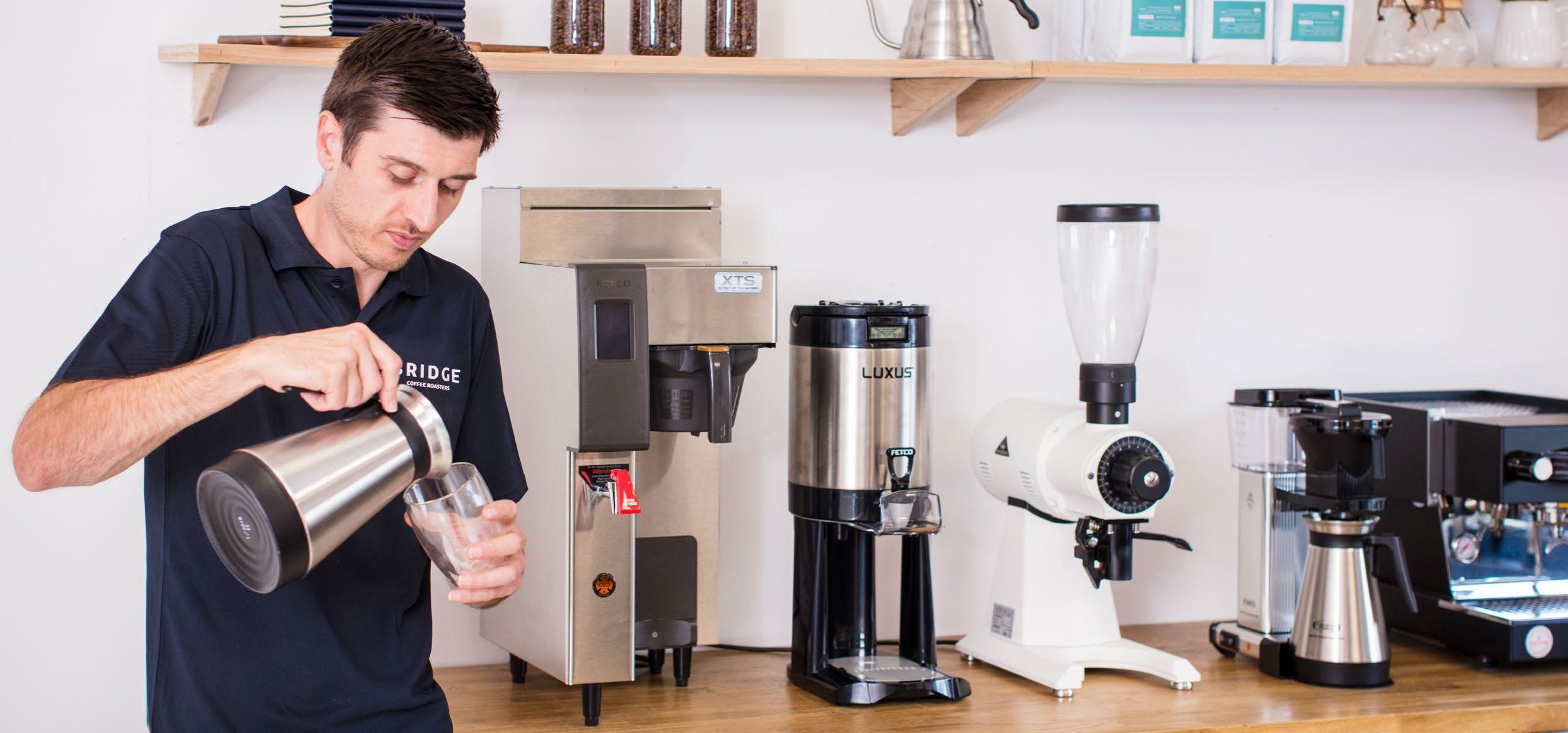
Filter coffee machines are designed to brew large quantities of coffee quickly and efficiently. The coffee brewed is a black coffee that can be served as-is or with milk and sugar, and is typically referred to as filter coffee, black coffee, diner coffee, batch brew or drip coffee. Often used in settings like hotels, offices, and events, these machines are perfect for self-serve environments where customers can pour their own coffee quickly and hassle-free.
Pros:
• Speed and Efficiency: Capable of brewing large batches of coffee quickly, these machines are perfect for high-demand situations.
• Affordable: Filter coffee machines are generally more cost-effective than other types, making them an attractive option for businesses on a budget.
• Ease of Use: These machines are straightforward to operate, requiring minimal training for staff.
• Self-Serve Friendly: Ideal for settings where customers need to serve themselves, such as breakfast buffets or conferences.
Cons:
• Limited Drink Variety: Filter coffee machines only brew one type of coffee (black), limiting the options available to your customers.
• Brew Times: While they can produce large quantities, the brew time for a batch can range from 5 to 10 minutes, which might not be ideal during peak times.
Filter coffee machines are perfect for businesses that need to serve large quantities of coffee quickly and efficiently, such as hotels, offices, and large events. They are also a great second option to go alongside your main coffee machine to offer a different style of coffee and aid in the rush during your busiest periods. If your business model relies on offering a variety of coffee drinks or a high level of customisation, filter coffee machines alone will not meet your requirements.
Click on the machines to learn more about them Click on machinesthe to learn more
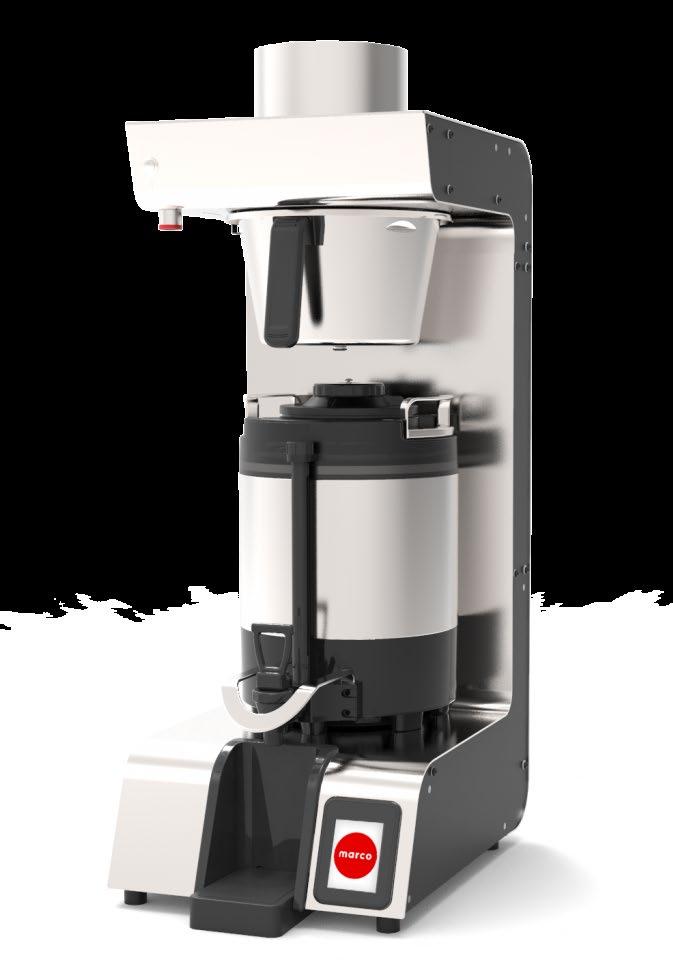
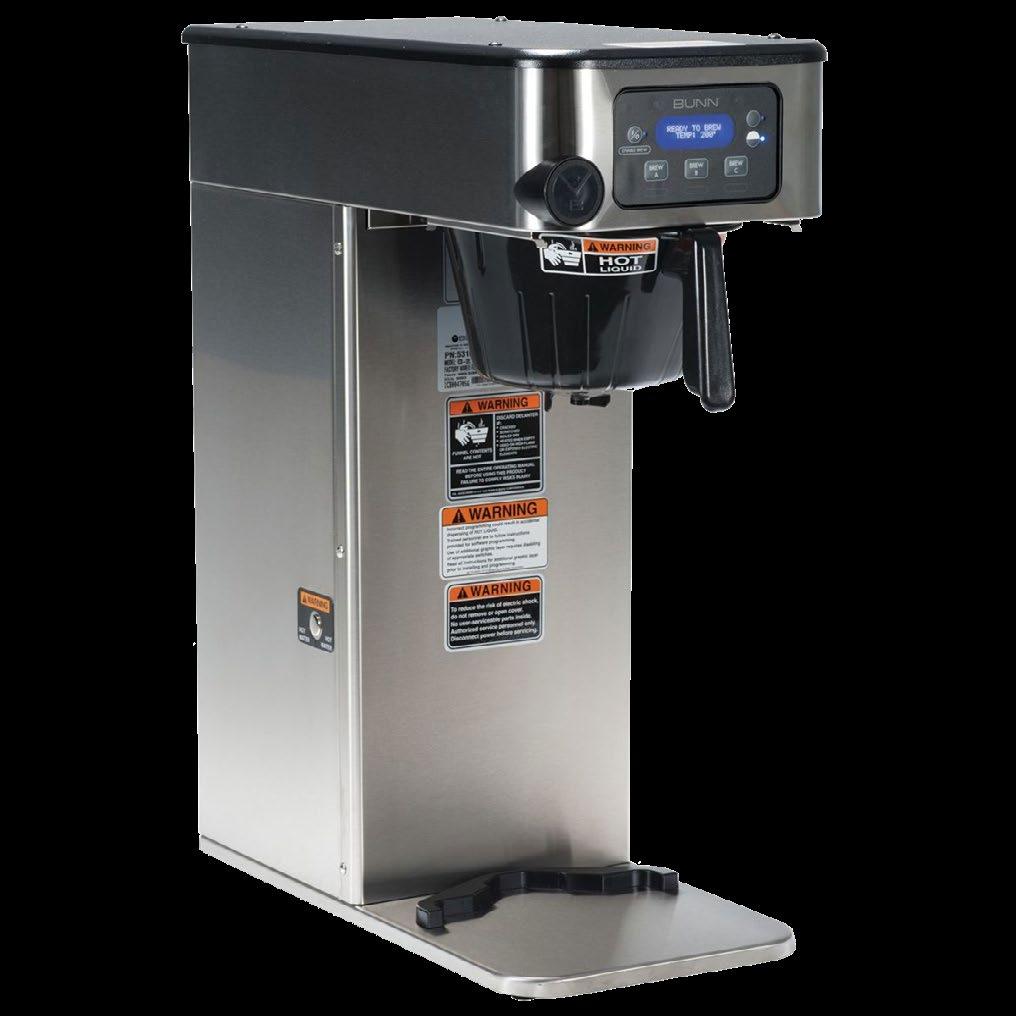
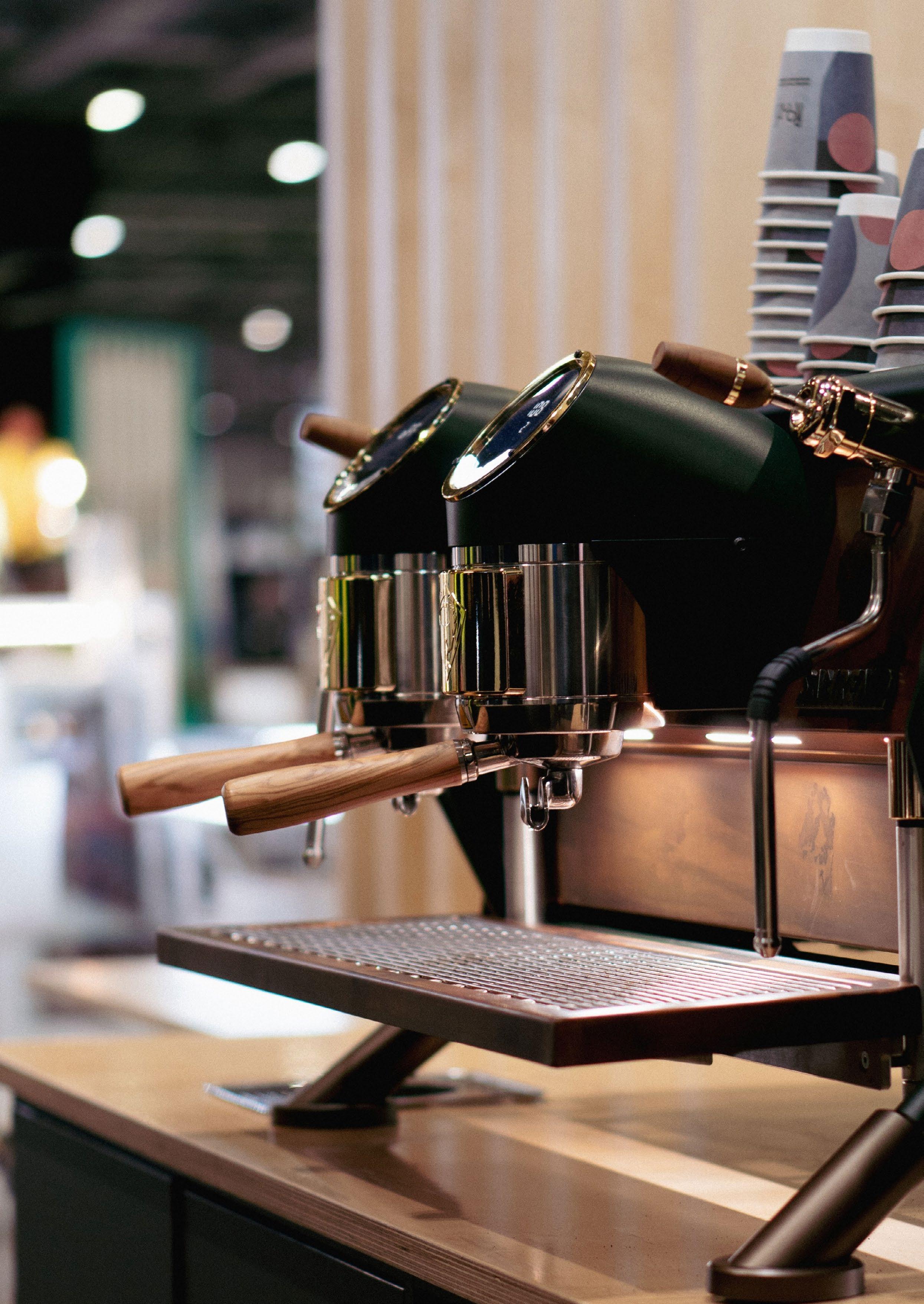
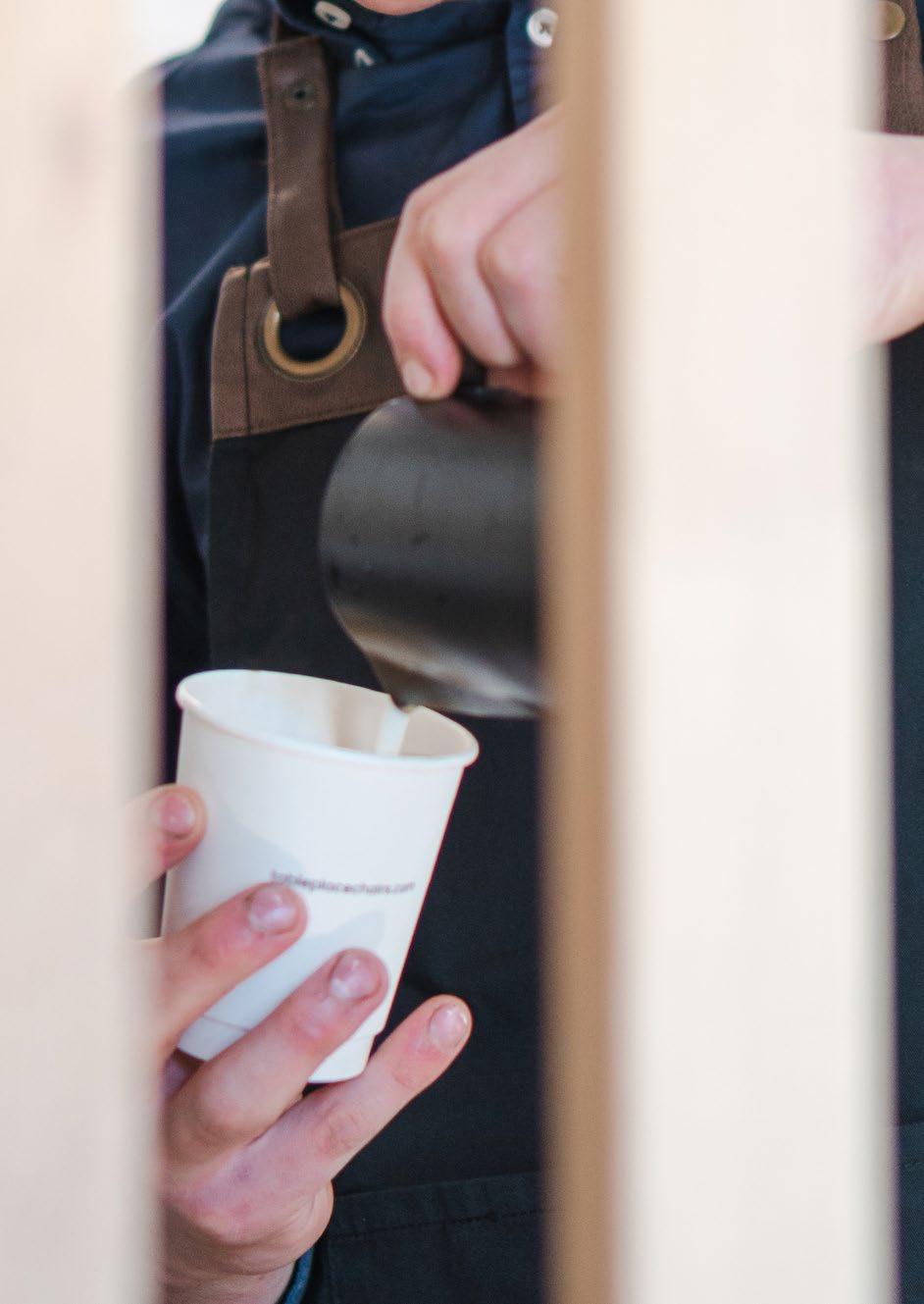
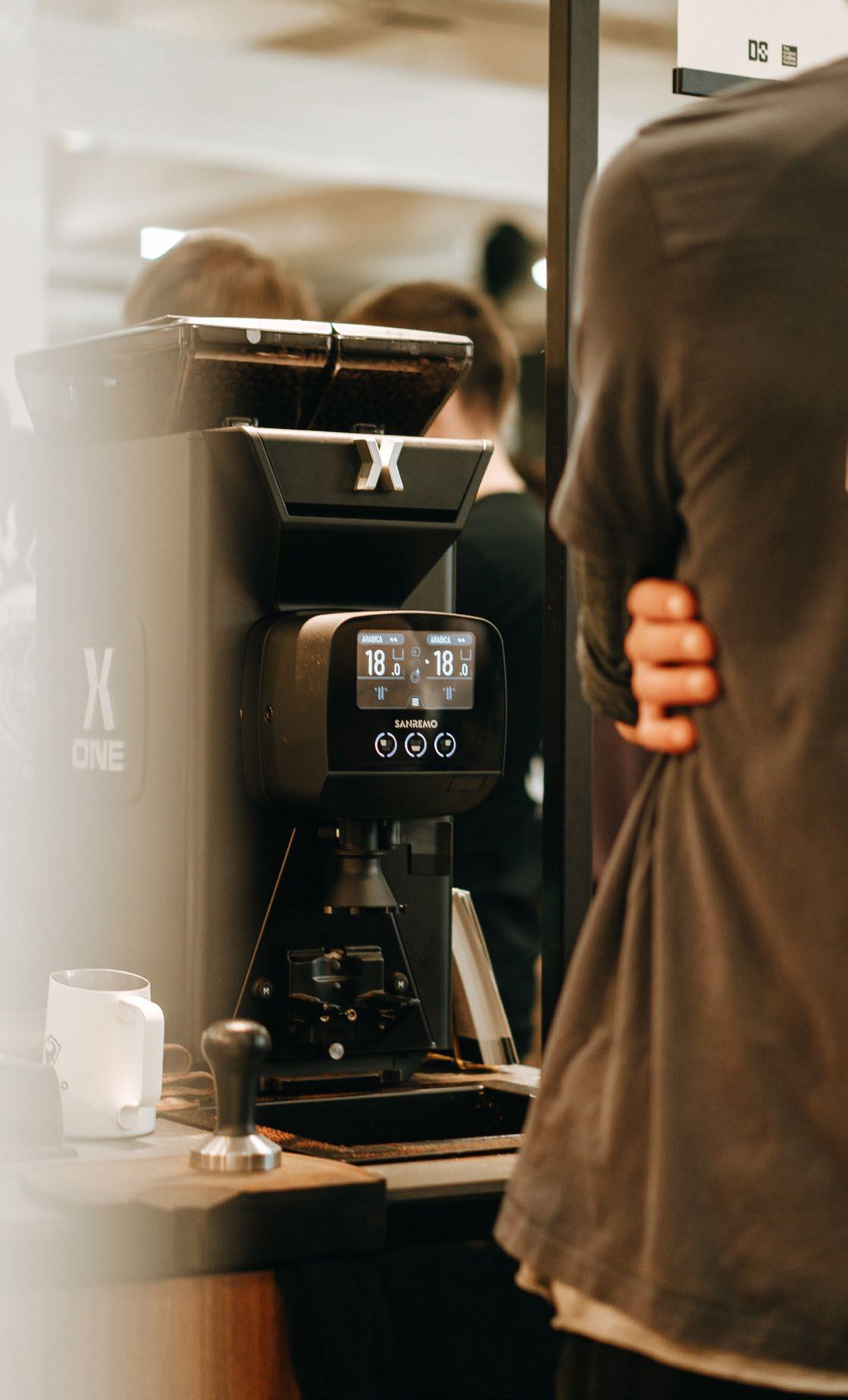
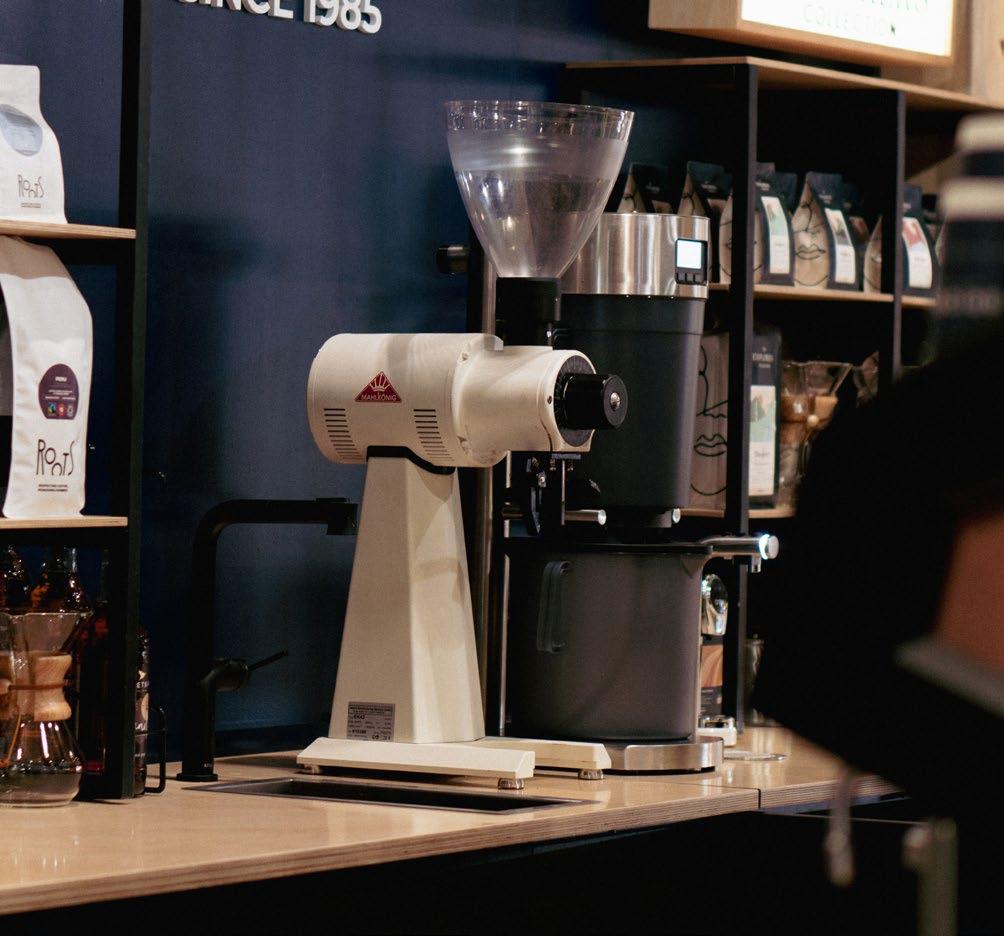
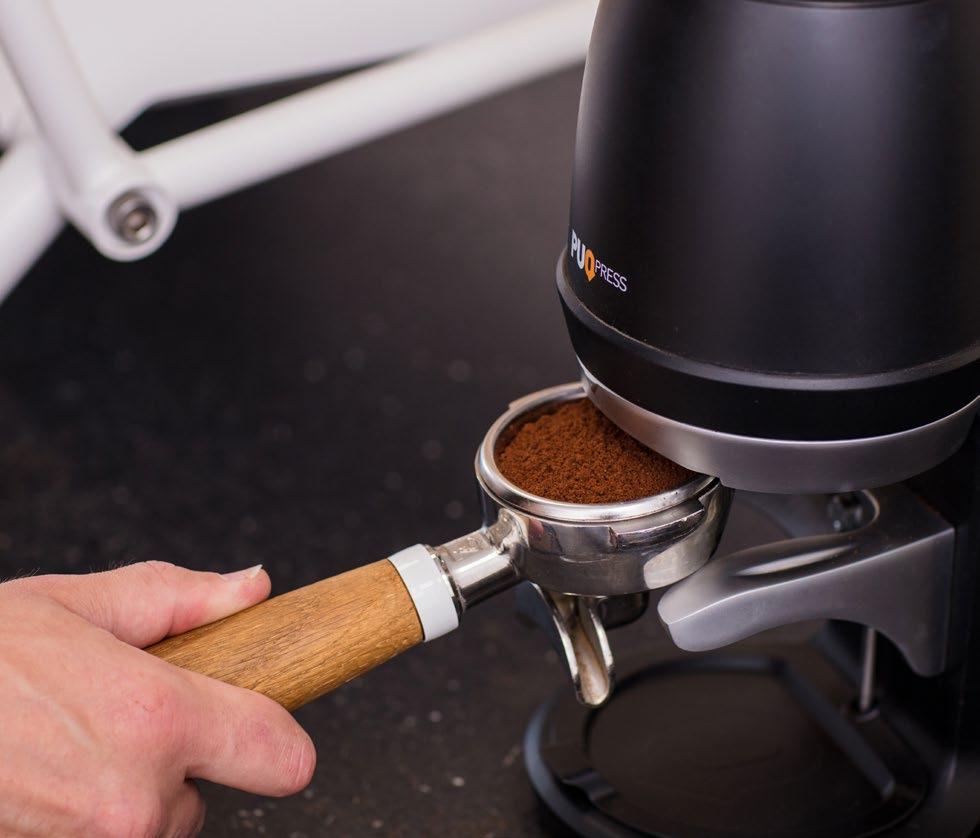
When it comes to purchasing a coffee machine, you may also want to consider a number of extras and additional tools.
Bean to cup machines and super automatic machines are able to fully automate the coffee brewing process, and so do not necessarily require any additional gear. Conversely, traditional espresso machines require a few additional accessories and machinery to help your barista brew coffee - the most necessary of these being a coffee grinder.
Here are just a few additional tools you may want to consider for your coffee outlet to boost the coffee quality of your outlet and efficiency of your teams.
A necessary requirement for traditional espresso machines and filter coffee machines to turn your freshly roasted beans into a fine powder ready to brew. These are built into bean-to-cup and super automatic machines, so are not strictly required for all coffee outlets.
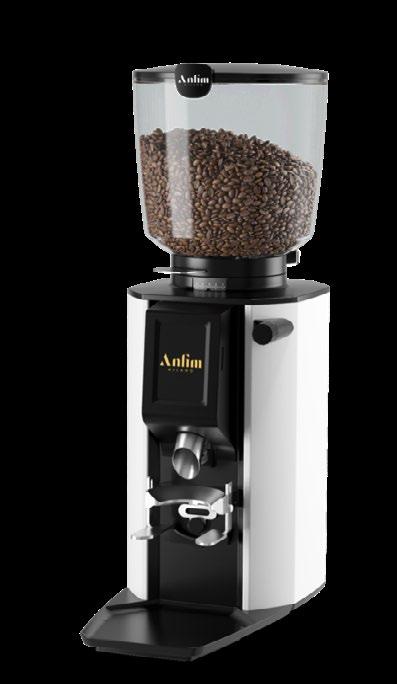
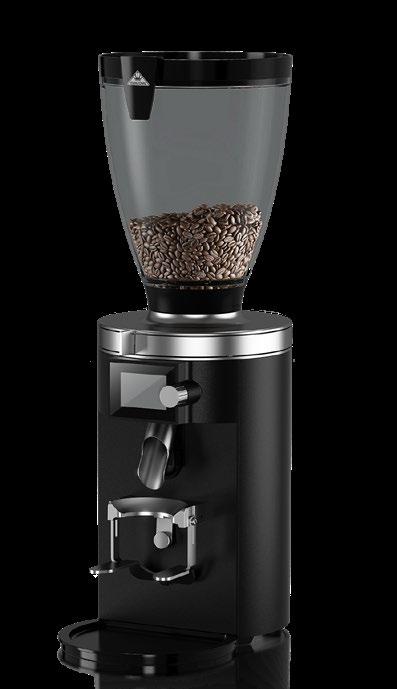
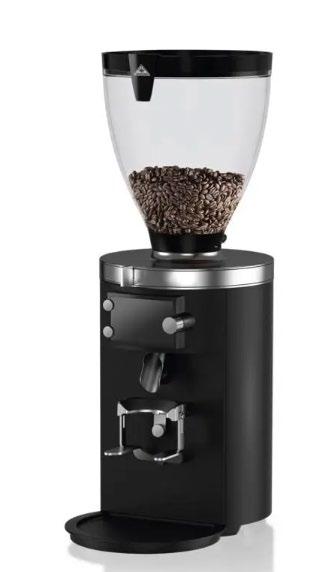
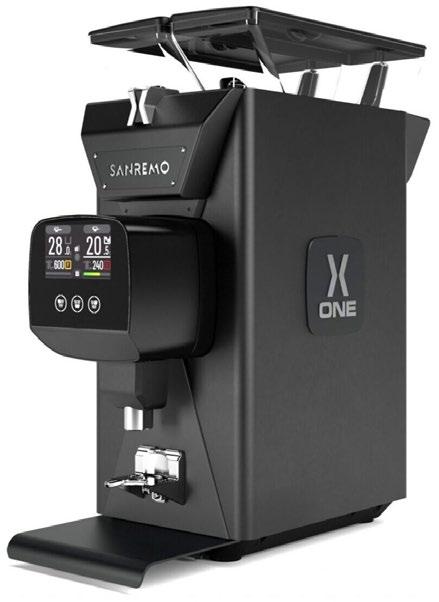
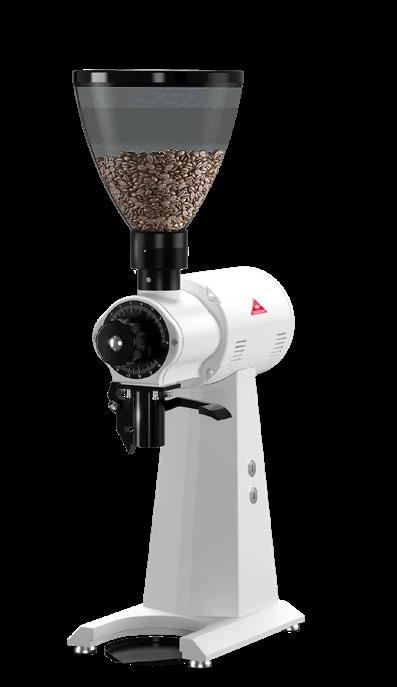
Before your finely ground coffee is ready to brew for espresso, it must be tightly compacted or ‘tamped’ into a dense puck of coffee. This is traditionally done manually using a tamper, which can cause inconsistencies when not performed properly.
Automatic tampers ensure the perfect tamp, aids consistency between baristas, help reduce strain to the wrists, and are a great option for traditional espresso machine setups.
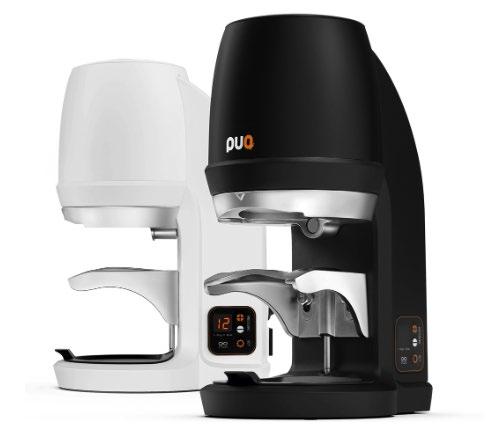
Your baristas will need a way of disposing of their used coffee grounds after brewing a drink. The most common solution to this is a knock box or drawer that sits underneath your coffee grinder, a freestanding knockout bin or an in-counter knock shoot that sits over a bin.
A ‘nice-to-have’ addition to your coffee bar is an automatic portafilter cleaner, helping to remove the spent coffee pucks from your portafilters and dumping them into a bin below.
Tools
Your baristas may need additional tools for steaming milk, creating specialty drinks, and for basic cleaning. This includes milk steaming jugs, barista towels, small whisks, temperature strips, brushes, cloths, spoons, scoops, scales, tampers, espresso glasses, tampers and tamping mats.
Steaming a perfectly textured milk drink is one of the most difficult steps to master when crafting the perfect coffee. An optional machine that could sit alongside your traditional espresso or bean-to-cup machine to improve the quality of your milk and aid with pouring latte art is an automatic milk steaming system. These dose the perfect amount of milk for each coffee, reducing wastage and increasing the speed and productivity of your staff.
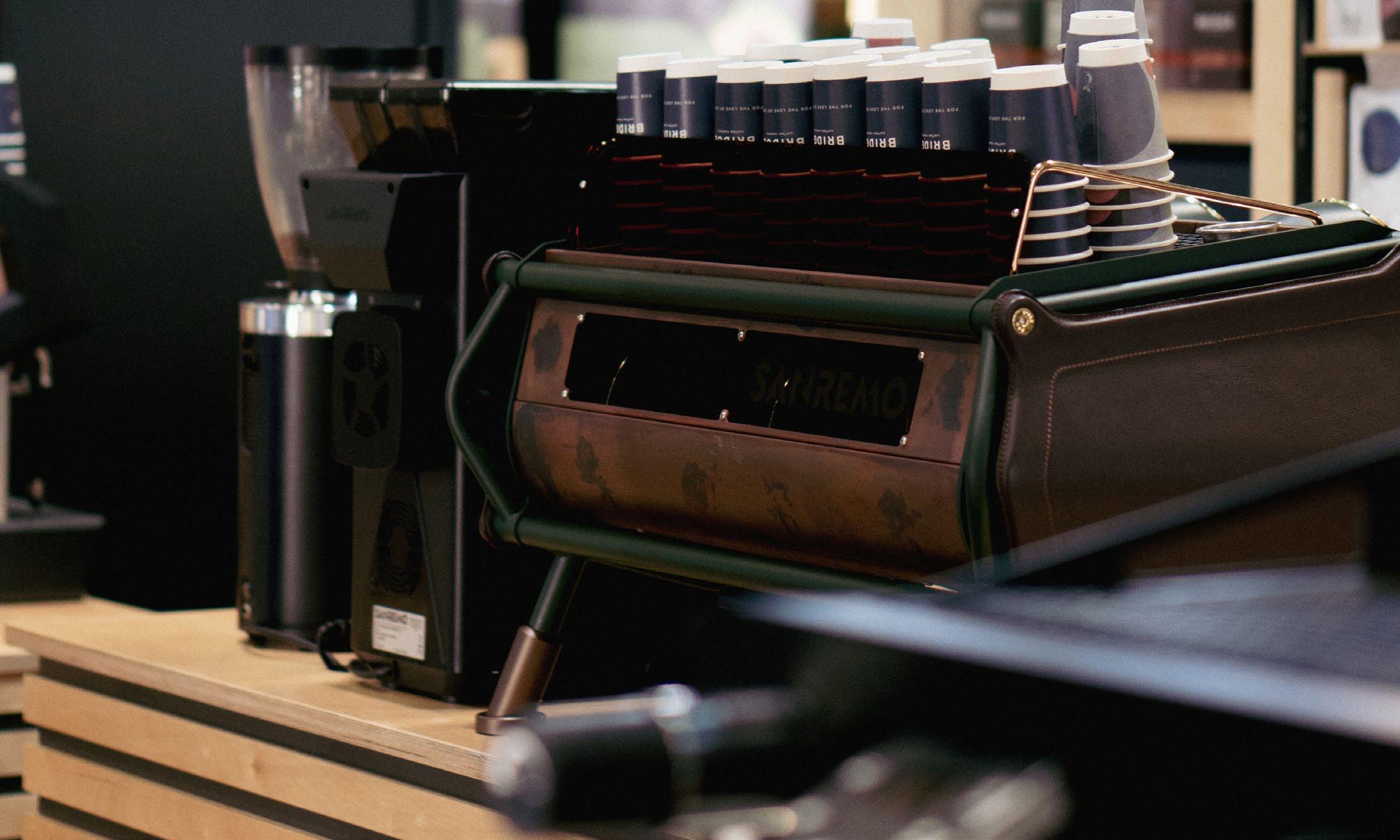

So, that’s a quick look into the different types of coffee machines available to your business, their positives, negatives and who they may be best for.
Next up, let’s discuss what you should consider before purchasing a commercial coffee machine, which will help you be more specific in your criteria.
What type of coffee experience do you want?
Before making any decisions, ask yourself what kind of coffee experience you are imagining for your business.
Where is this coffee machine going, and what kind of interaction do you want it to have with your customers and staff?
Are you picturing a member of your team expertly crafting a coffee that’s customised and perfected to the needs of each customer? Or do you see coffee as a more transactional or ‘nice-to-have’ part of your service offering, with a standard set of drinks that can be brewed seamlessly at the touch of a button, either by staff or self-serve?
The coffee machine you invest in has a huge impact on the coffee experience you are able to provide for both your customers and your staff.
If coffee is a core part of your business, and you want ultimate control and the highest coffee quality possible, a traditional espresso machine will suit you perfectly. However, these require a trained team of baristas who know how to get the best out of the coffee. If that is too much of an ask of your staff, then a super automatic espresso machine will be your best option.

If coffee is going to be a part of your service offering, and you want a seamless way of providing good tasting drinks, a bean-to-cup machine will be your best bet. These can be operated by anyone, either a member of staff or the customer themselves with many bean-to-cup machines offering payment options built-in.
Filter coffee machines are more flexible. They can be a great option for high-volume, self-serve environments, where a large amount of coffee is needed, and also as a secondary brewer to sit alongside espresso or bean-to-cup machines to serve a delicious single origin filter coffee.
Keeping in mind the type of coffee experience you want to offer is absolutely paramount for the kind of machine you should ultimately invest in, these are the main things you should think about.
Coffee is part of your brand reputation
• Drink flexibility and menu customisation
• Barista operated
• Highest level of coffee quality Sense of the craft
• Highest level of coffee quality Consistency between every cup
• Staff and customer interaction
• No need for skilled baristas
• Coffee is part of your brand reputation
• Coffee as part of your service
• Speed and ease of use
• Staff operated or self-serve
• Standard set of curated drinks
• Instant service once brewed
• Self-service or poured by staff
• One coffee type, limited customisation
• Great secondary brewer option
How much coffee are you going to serve on a daily basis? For businesses looking to upgrade their coffee machine, capacity and speed are two common complaints and reasons for upgrading.
Investing in coffee machines that are rated by the manufacturer for the volume of drinks you predict to be serving is absolutely crucial. This ensures your customers are served quickly during your busiest periods now, but also that the machine continues to perform and can support your business as you grow.
If coffee is a new venture for you, it can be hard to predict exactly how many cups per day you’ll be serving. It will absolutely fluctuate across the week and throughout the seasons. As a business that has helped hundreds of people in your position,we’re confident we can make an accurate prediction based on a number of factors including:
• Your business type
• Location
• Physical capacity Nearby competition
Get in touch with us for an initial consultation and we’ll give you more information.
High order volumes can not only impart customer frustration if they have to wait around, but can also reduce your coffee quality, if the machine isn’t up to specification. Typically, machines with higher capacities in terms of cups per day require a greater capital investment. So, make sure to consult with your coffee partner about the level of capacity you should be investing in.
Ready-brewed filter coffee can be poured almost instantaneously, whereas espresso-based drinks typically require 30-60 seconds to be crafted. Make sure to take into consideration how quickly the coffee needs to be served at any one time and whether customers will be happy to wait.
A great option for speeding up the service of your espresso based drinks is to invest in a machine with multiple group heads or coffee brewing units. For example, traditional espresso machines typically come with 2,3 or 4 coffee brewing group heads, which allow multiple coffees to be brewed simultaneously, and investing in more can help speed up service during busy periods.
However, in order to maintain a fast speed of service, a traditional espresso machine must be operated by an experienced barista with the practice and muscle memory built up to quickly brew great drinks without conscious thought. Without this resource, a super-automatic machine and bean-to-cup machine could be a better option for fast coffees of good quality.
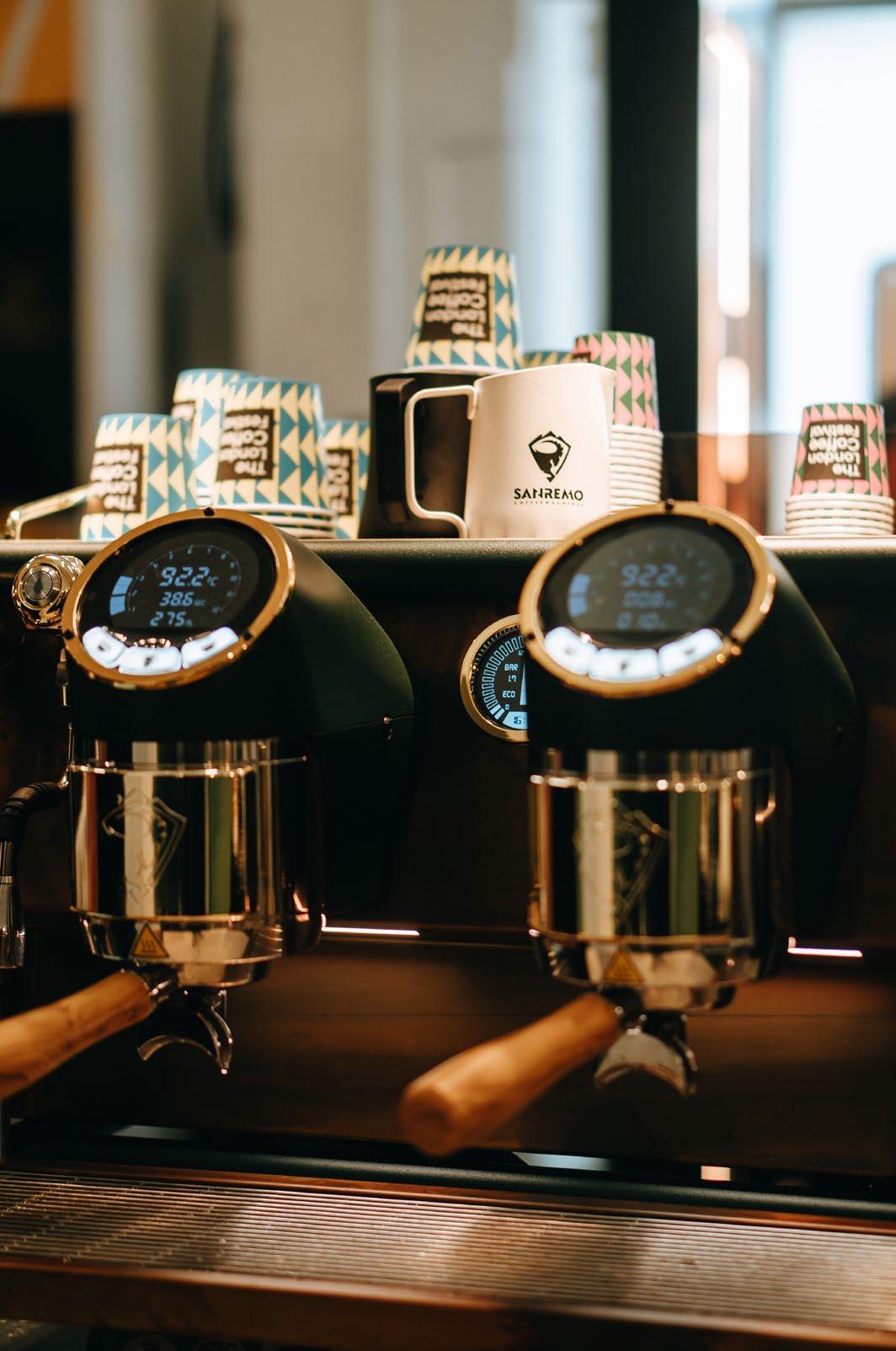
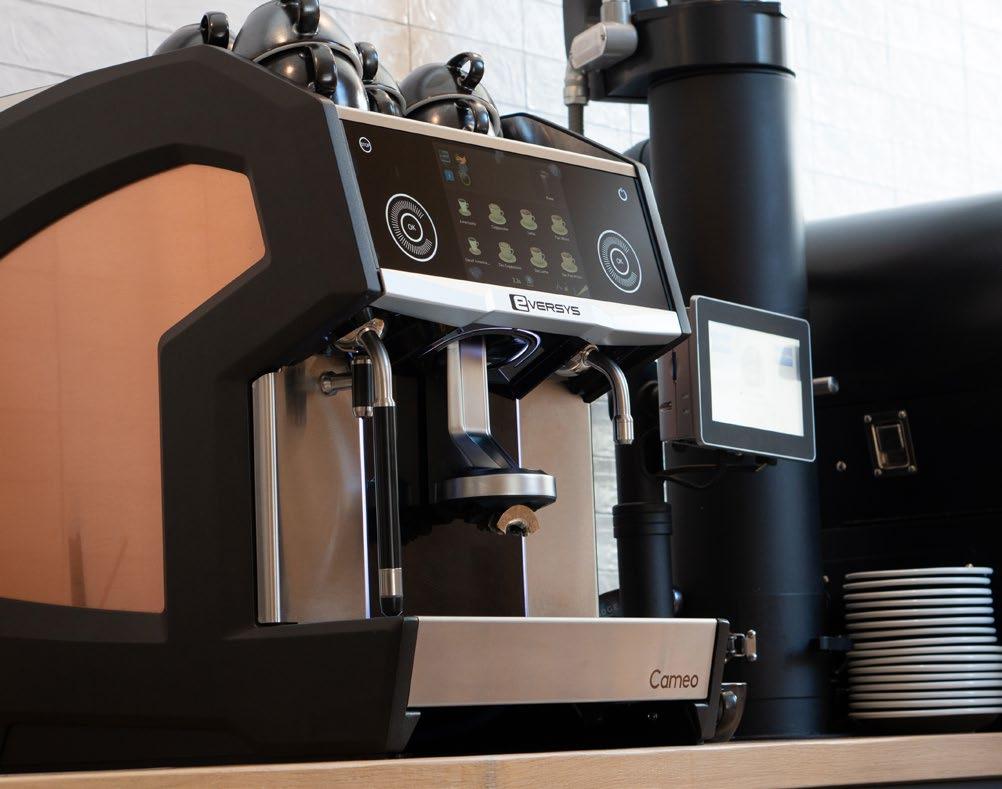
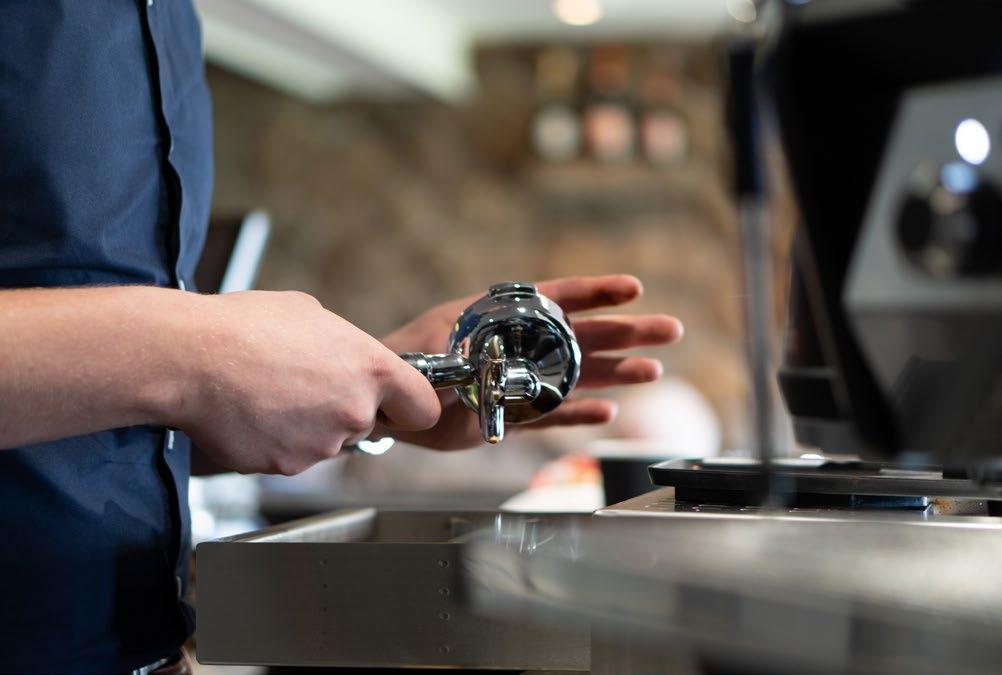
Do you have a good idea of the costs involved in purchasing a new coffee machine? Do you have a specific budget you need to stick to? How much are you and your business willing to spend initially on your commercial coffee machine?
People outside the industry can often be surprised at the price tag associated with coffee equipment. But the truth is, high quality, commercial level machinery is not a small investment.
The good news is, with so many machines on the market, there are options and coffee solutions to suit many price points. Our coffee machines range in upfront costs from around £4,000 to £60,000. It’s therefore worth consulting with your machine provider on any budget constraints you may have, and ask for a number of options at different price points.
If a large upfront investment is too much, there are finance options available (like leasing your coffee machine). The majority of our customers pay for their coffee equipment via a 3 or 5 year lease, avoiding the upfront cost. For example, a £10,000 coffee machine could cost you as little as £50 per week based on a 5 year leasing term.
You may also need to invest in additional equipment such as barista tools, water filters, coffee grinders, automatic tampers and potentially external automatic milk frothers. Making sure to enlist the help of an experienced coffee company is key to understanding exactly what equipment you’ll need from day one, and which can be avoided to save on the upfront cost.
Consider a number of options at different price points, discuss your finance options, and make sure capital investment is something you consider during your decision making process.
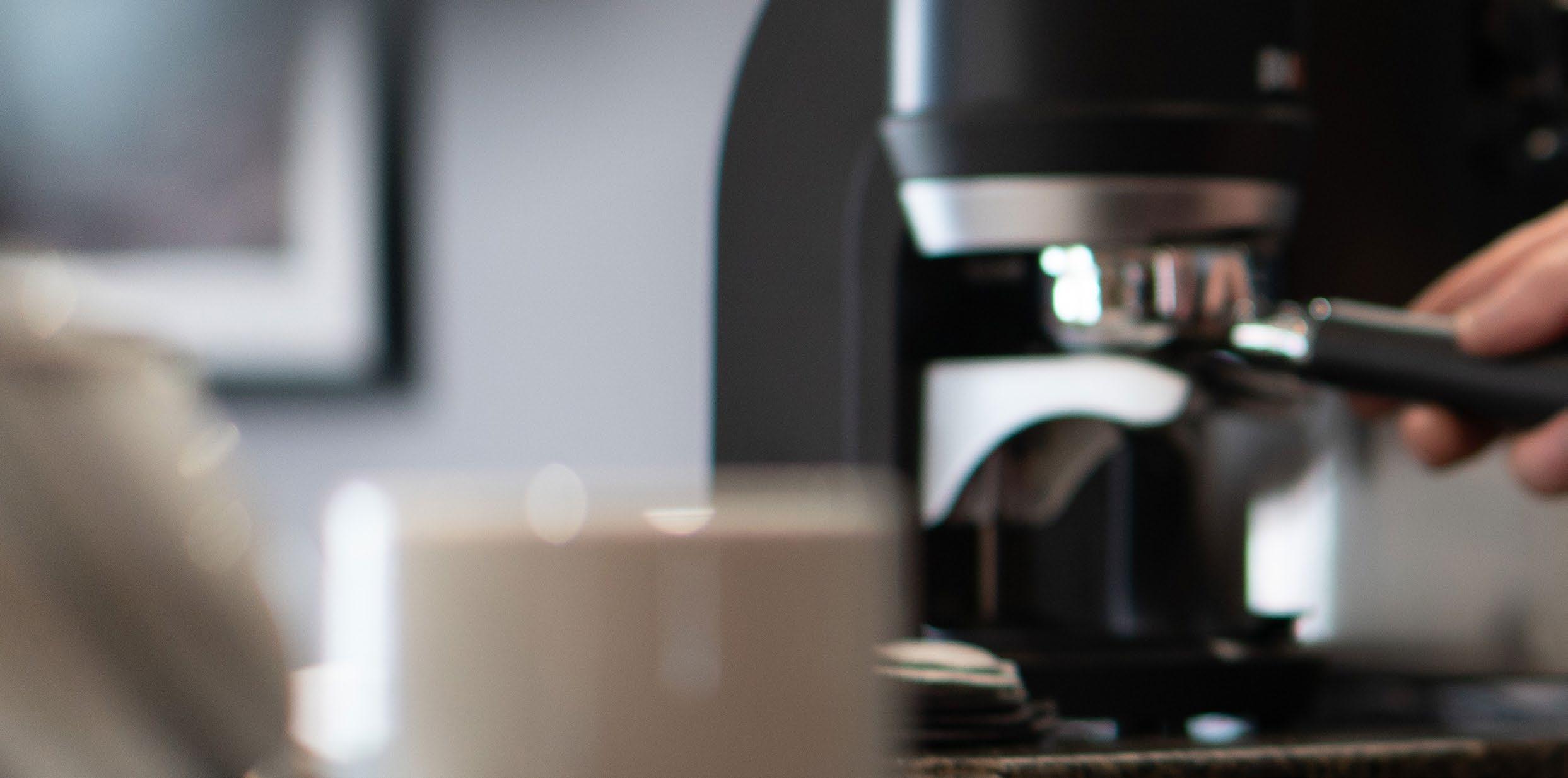
As well as the cost of purchase, also think about your ongoing costs, like those that come from maintaining your machine in the long term.
This is really important - the better care you take of your machine, the longer it will last your business. So, make sure to maintain your machine to protect the value of your investment. Here are just a few of the ongoing lifetime costs you should know about:
Keeping your machine clean, inside and out, is the best thing you can do to ensure its longevity.
The cost of this varies by machine type:
Traditional espresso machines and filter coffee brewers are relatively cheap to keep clean, only requiring a widely available and very affordable espresso machine cleaning powder for deep cleaning. This is flushed inside your coffee brewing group heads for an internal deep clean, or ‘backflush’, or can be diluted down into a hot water bath for external cleaning. One tub of this should last you a year, and costs around £10.
Super automatic and bean-to-cup machines typically have manufacturer-branded bespoke cleaning powder, liquids, tablets or sachets that must be used to keep your machine performing optimally.
Annual Boiler Inspections
Legally, every pressurised boiler that produces steam must be tested every 12 months under the Pressure System Safety Regulations. These must be carried out by licensed, certified engineers, and typically cost £450.
Our trained and fully certified coffee machine engineers will perform this test to examine your espresso boiler pressure, safety valves, and the boiler itself.
Learn more about PSSR boiler inspections here.
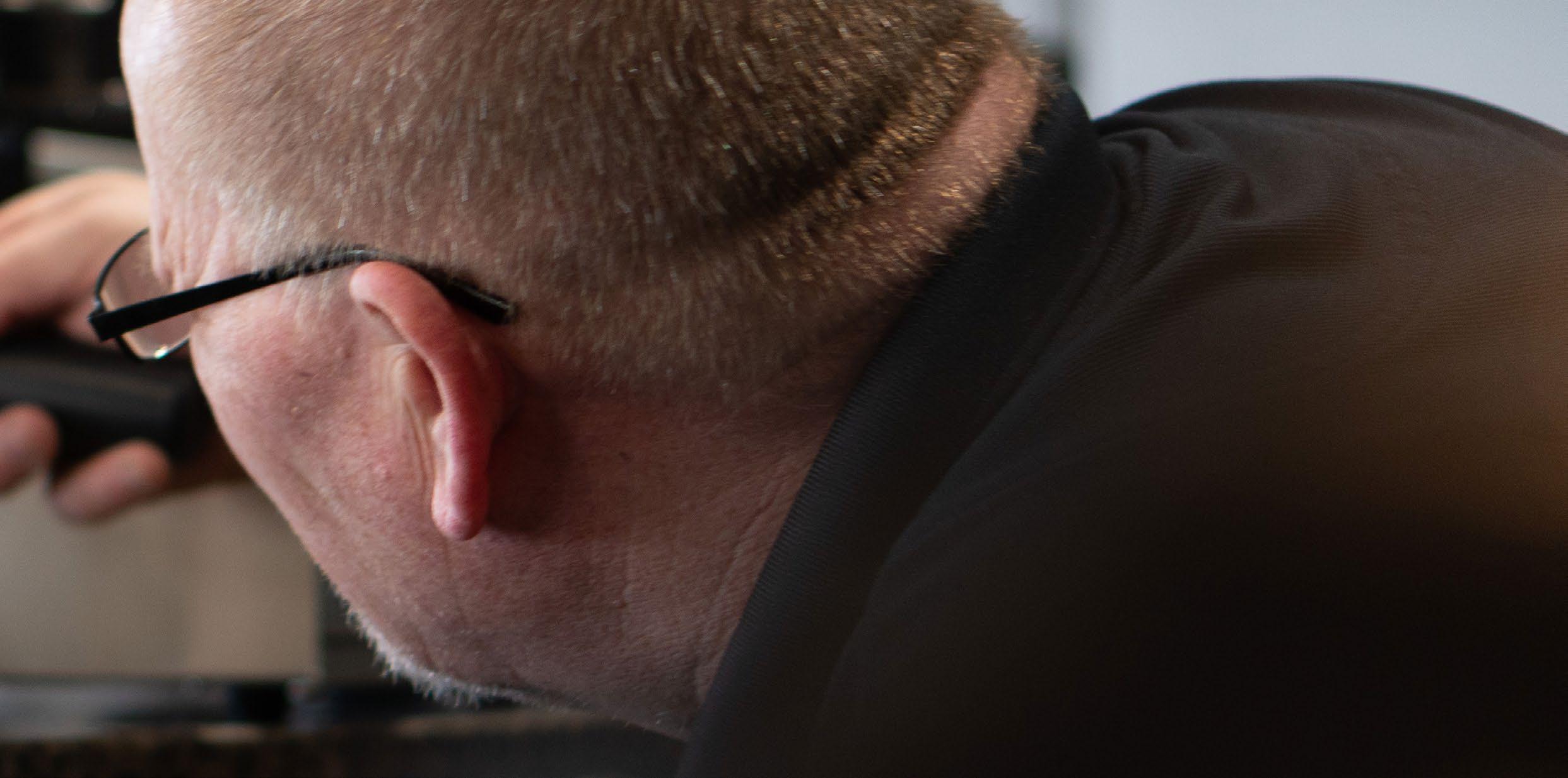
If your coffee machine goes down for whatever reason, and you’re not covered by a service plan, you’ll need to pay for an engineer to visit and make any repairs or replace broken parts. For pay-as-you-go customers, the cost includes an initial callout fee of £185, plus £15 for every additional 15 minutes of labour and the cost of replacement parts.
Typically, you can expect your coffee machine to break down 1-4 times per year, with traditional espresso machines and super automatic machines being more reliable than bean-to-cup machines.
All-Inclusive Service Plans
Nothing is worse than having a machine break down and not knowing who to call. Protecting your machine with a Gold or Platinum service plan entitles you to free repairs and replacement parts whenever things go wrong.
What’s more, a service plan also entitles you to 24hr response times, regular water filter changes, 6 monthly preventative services, free labour on-site and free virtual support.
These service plans vary in cost greatly depending on the type of machine, whether you’re also buying your coffee and supplies from us, and the total scope of your machine setup. However, service plans typically cost £500 to £3,000 per year, per machine.
Learn about our coffee machine repairs and service plans here.
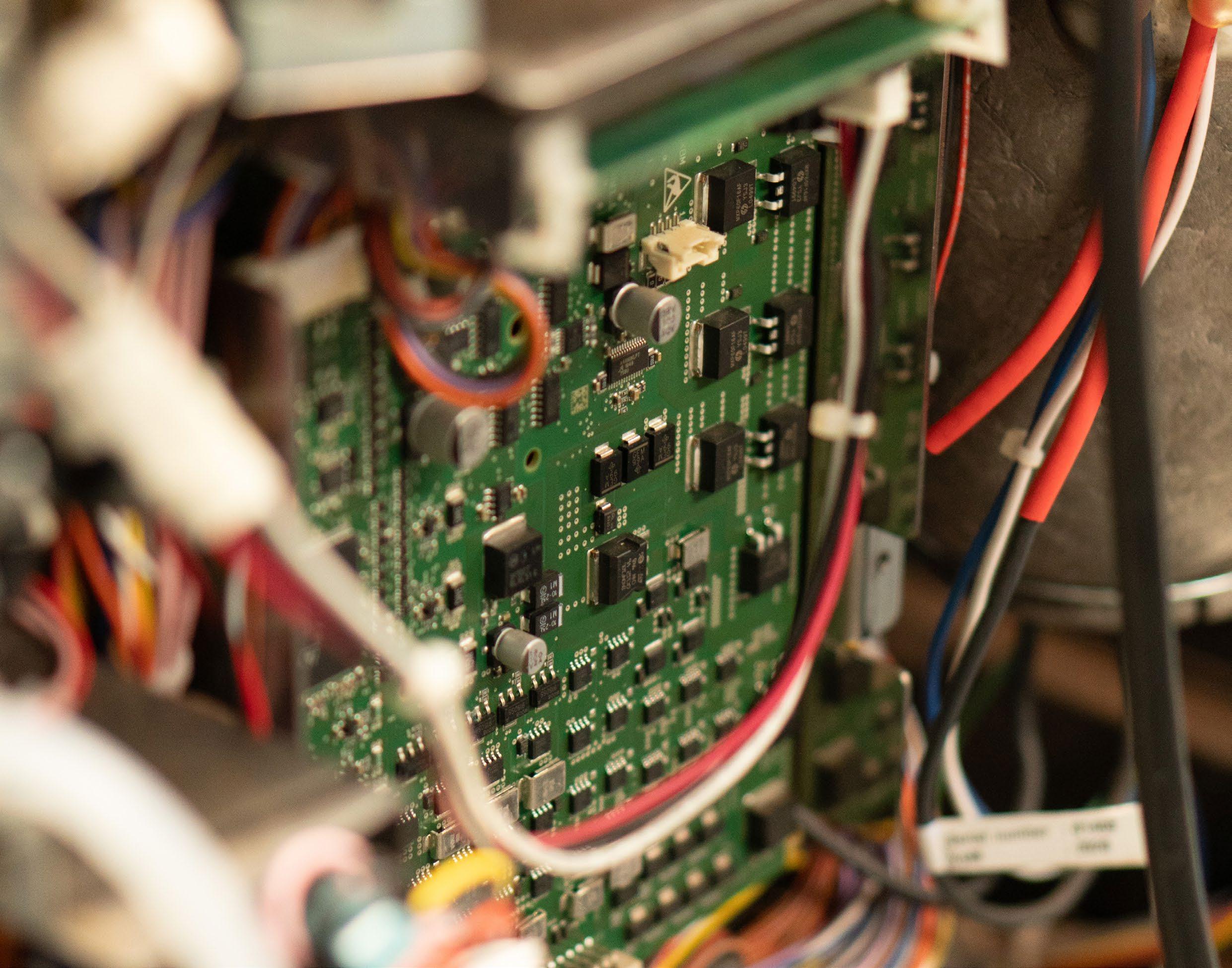
As briefly mentioned, each type of coffee machine requires some level of care and attention to remain in top performing condition - for better coffee, and a longer life span.
Different categories of machines require different levels of upkeep, with traditional espresso machines seen as the most ‘bulletproof’ machine type.
We typically recommend that traditional espresso machines, bean-to-cup machines and super automatic coffee machines are cleaned daily, whilst filter coffee machines should be rinsed after each use.
If you forget to clean a traditional espresso machine, you may have a stale-tasting shot of espresso first thing the next morning, but the machine should be fine. However, forgetting to clean a bean-to-cup machine can easily cause buildup of milk and coffee oils leading to blockages, and breakdowns.
Super automatic machines take most of the hassle and guesswork out of the process. These machines will lock you out of brewing coffee if it hasn’t been cleaned using the right chemicals in the last 24 hours, so they’re perfect for businesses worried about teams not properly taking care of their machinery.
Here is a brief summary of the kind of maintenance and upkeep your machine will require from you and your team.
Regular external cleaning throughout the day and at end-of-service with damp cloth and hot soapy water.
• Full deep clean of external surfaces, drip tray and brushing down group heads at end of service.
• Soak portafilter baskets and steam wand tips in a hot cleaning bath for 5 minutes at the end of service.
• Daily backflushing of group heads with espresso machine cleaning powder at the end of every service.
• Weekly remove shower screens and gaskets from the group head for a brush down and rinse.
• Regular external cleaning throughout the day and at end-of-service with damp cloth and hot soapy water.
• Daily deep clean of coffee brewer, water system and milk systems using manufacturer provided cleaning chemicalsfully automatic.
Regular external cleaning throughout the day and at end-of-service with damp cloth and hot soapy water.
• Daily deep clean using manufacturer provided chemicals, following the steps on screen.
• Full descale procedure using manufacturer provided chemicals every 6 months.
• Rinse with hot water after each use.
• Clean with hot soapy water at end of service.
• Boiler descale every 6-12 months.
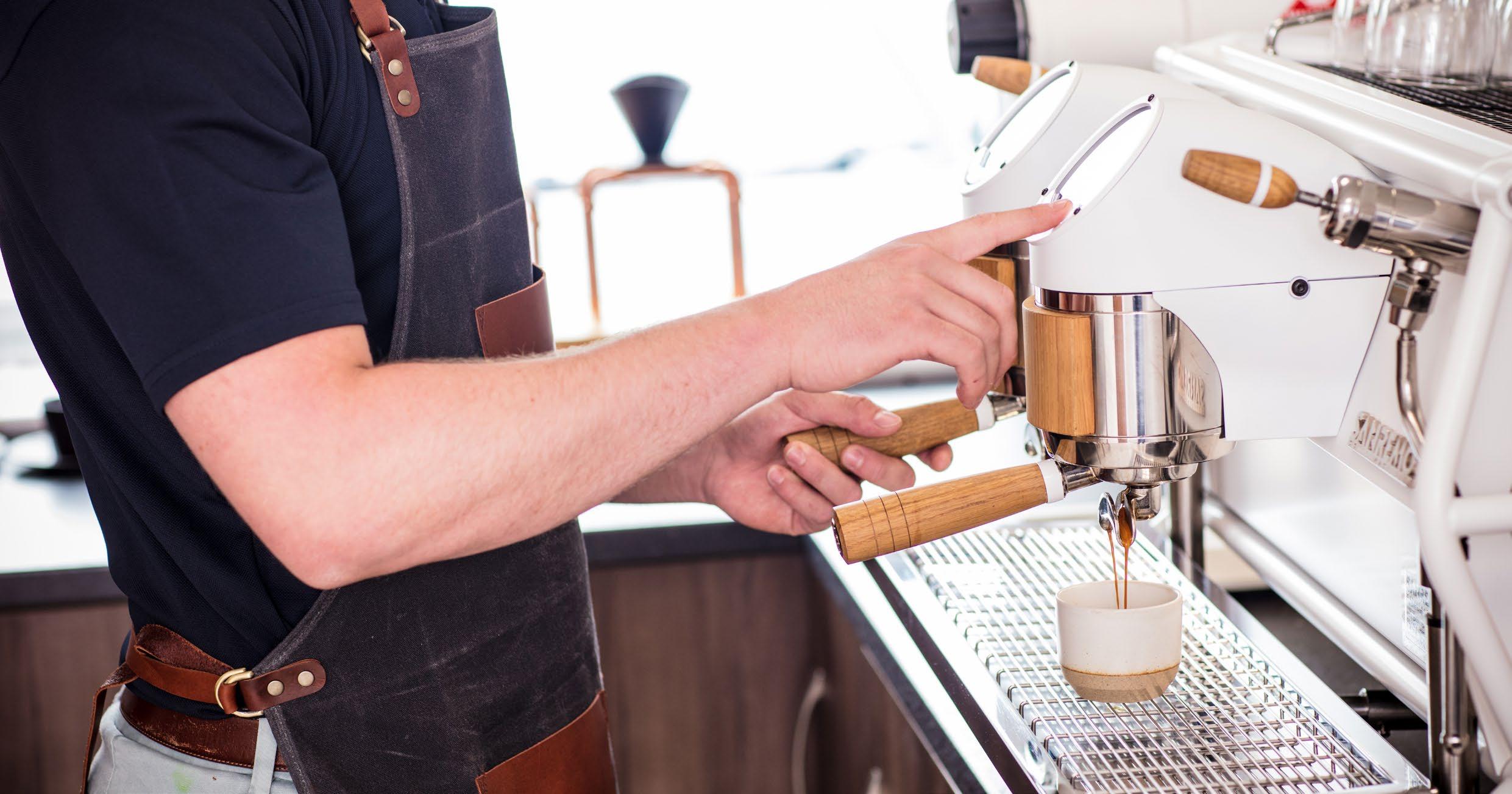
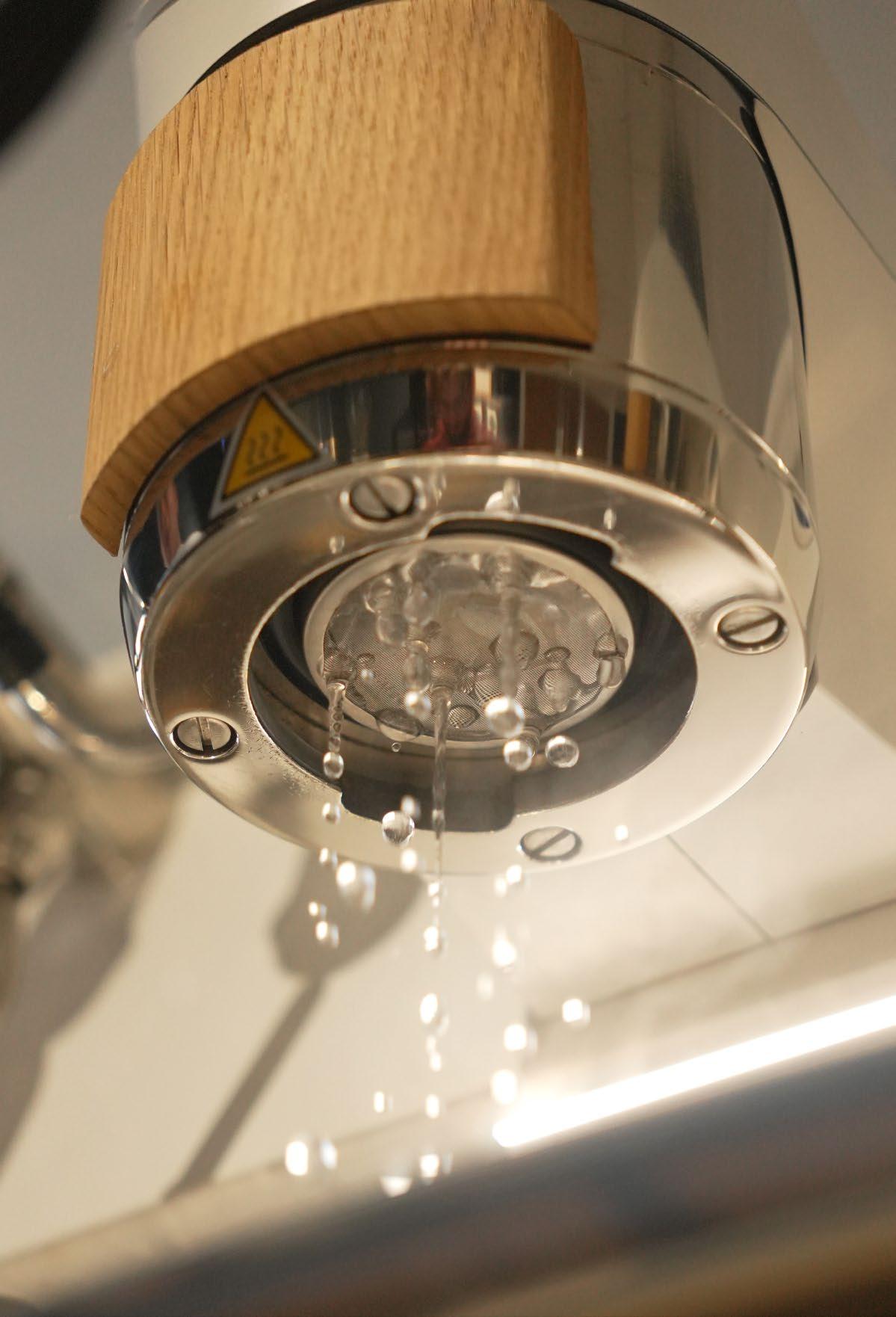
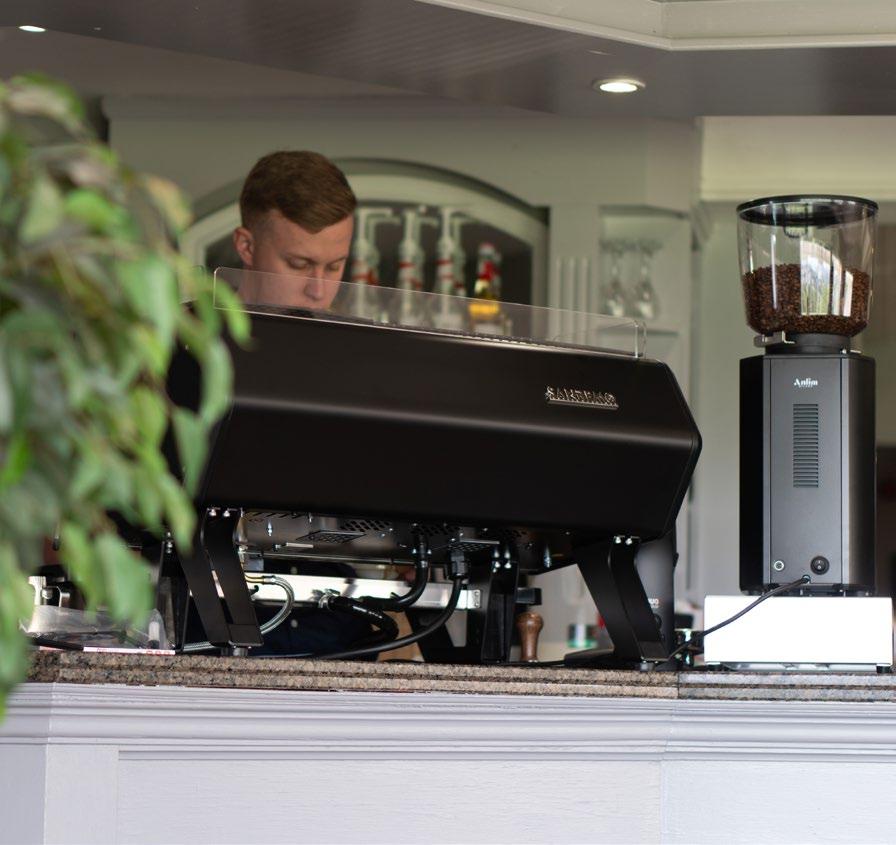
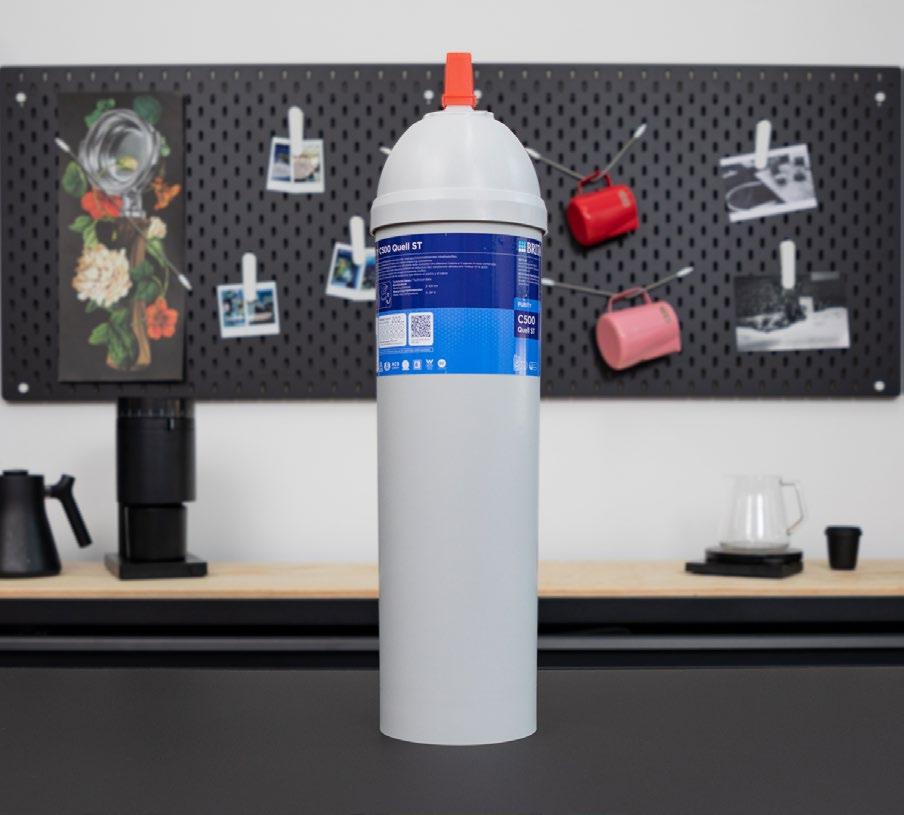
A high quality water supply is an often overlooked aspect of using a commercial coffee machine that can make a huge difference to the quality of your coffee, and health of your machine.
Water makes up over 90% of a cup of filter coffee or espresso. The minerals and chemical makeup of that water has a large effect on the taste of the coffee.
Tap water in many areas of the UK contains a chemical makeup that is unsuitable for brewing coffeewith hard water leading to bitter, harsh flavours and soft water leading to dull, flavourless cups.
What’s more, water with the wrong chemical makeup can lead to limescale build up over time. Left unchecked, this can be a disaster for your coffee machine, creating blockages and reducing the effectiveness of your machine.
That’s why it’s essential for your coffee machine’s water supply to be tested and properly treated according to its chemical makeup by a trained engineer. In most areas of the UK, this is as simple as performing a hardness test on your water and installing a coffee brewing water filter into the water line before it reaches the coffee machine.
Learn more about water filters for coffee here - A Cafés Guide to Commercial Water Filters
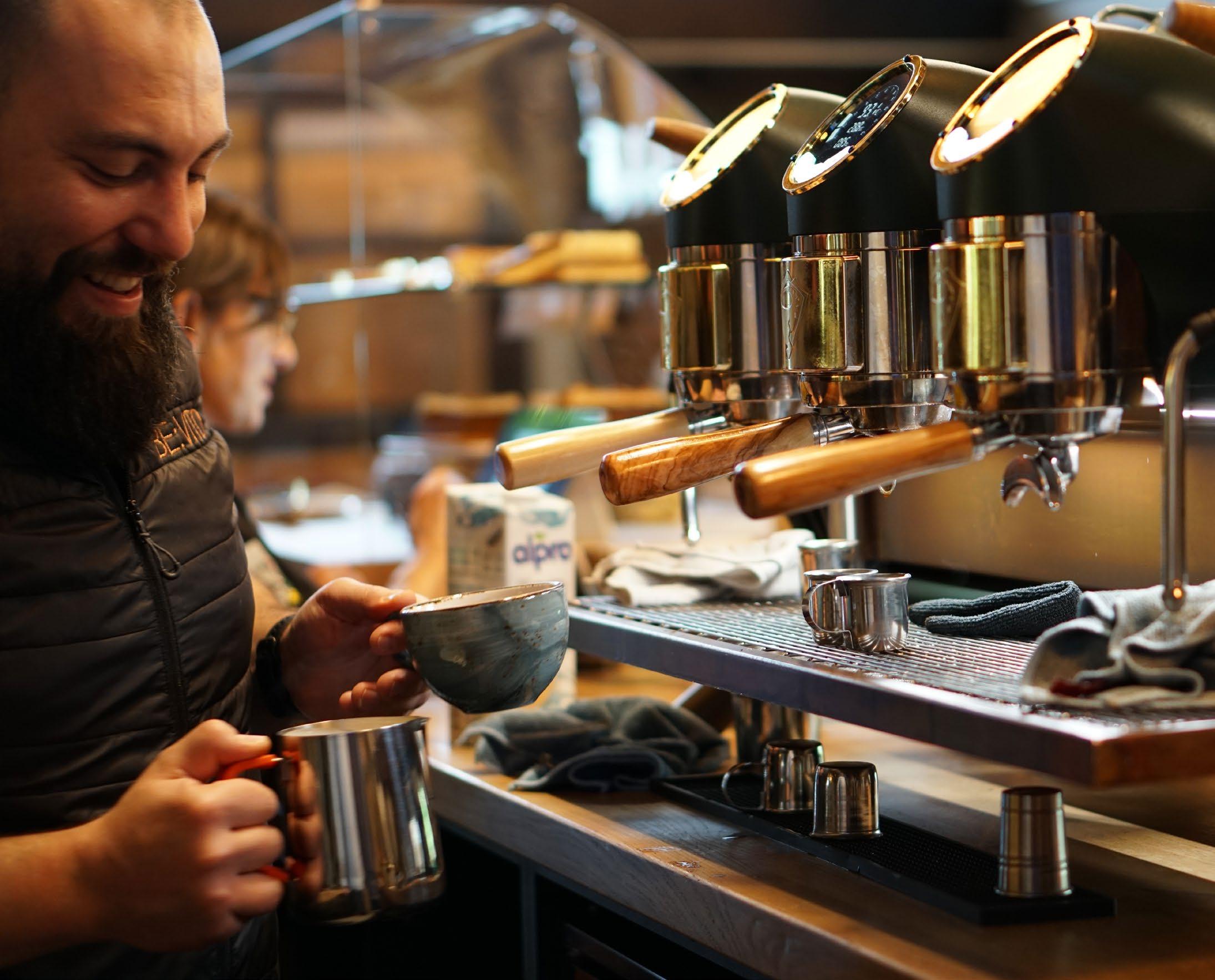
When installing a new coffee machine, it’s essential to consider both the machine’s power requirements and the electrical supply available in your outlet. In the UK, common power requirements for commercial coffee machines based on usage volume are:
Low volume: 13 amp (typically 2.9 kW)
• Medium volume: 16-20 amp (typically 3-4.6 kW)
• High volume: 32 amp or more (typically 7 kW+), often requiring three-phase power.
While higher amperage can improve machine performance, including more stable temperatures and increased capacity, it’s important to ensure your venue’s electrical setup matches the machine’s requirements. If necessary, upgrading your electrical supply can offer long-term savings and better overall performance.
In general, we would always recommend having your machine running off the highest power supply possible - This will increase your machines capacity, provide more stable temperatures and improved performance, whilst typically being more energy efficient.
One of the greatest challenges in the food, beverage, hospitality and coffee industries is one that you’re likely very familiar with - staff turnover.
Retention is particularly challenging for coffee businesses, thanks to the high level of training and experience required for skills like latte art, proper milk steaming, recipe knowledge and coffee extraction.
Whilst traditional espresso machines are a fantastic choice for the knowledgeable barista, it’s unrealistic to suggest that anyone and everyone can use one to brew great coffees from day one. Getting the most out of a traditional espresso machine requires time, knowledge, and often, formal and regular barista training sessions.
You therefore need to consider whether high levels of coffee quality and recipe customisation are an absolute must for your coffee setup, and if you’ll be able to provide your team with the time and resources to keep their skills in top shape, even when people decide to leave and need replacing.
For teams that aren’t able to maintain a high level of skill, super automatic machines and bean-to-cup machines are there to help.
Super-automatics aid your barista by lowering the barrier to entry, helping them get great tasting coffee and perfectly steamed milk in every cup, whilst bean-to-cup machines completely take the brewing process out of their hands.
So, if your staff will be wearing many hats and coffee is not their primary focus, or if you struggle with staff retention and don’t have the resources to make sure they are regularly trained on coffee, consider giving them a helping hand with automatic machinery.
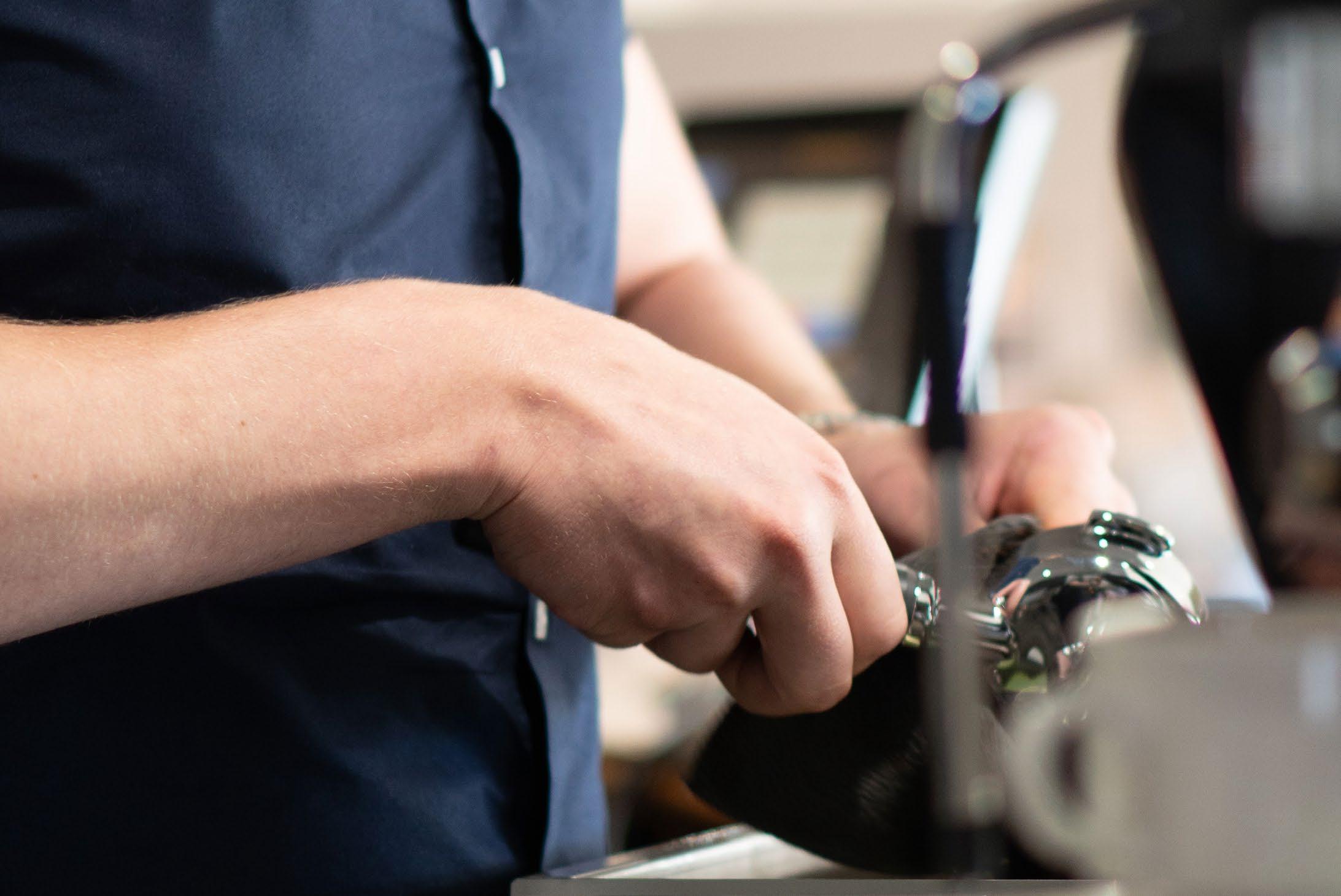
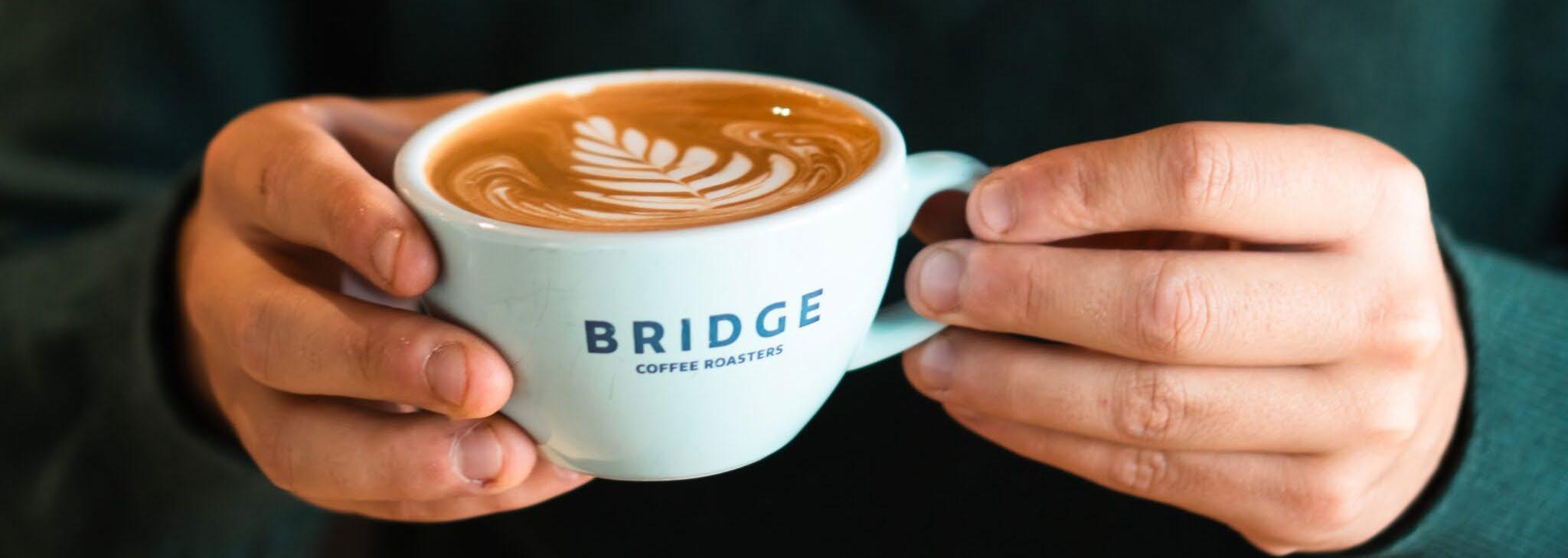
Who you buy or lease your coffee machine from can often be as important as which machine you buy.
The majority of coffee machine manufacturers actually don’t sell directly to businesses like yours. Instead, they sell machinery through resellers, merchandisers, and full-service coffee companies like ourselves.
Those that do sell directly to businesses, often don’t include additional help or services to get you started, like installation, repairs and maintenance, service cover, barista training, and coffee beans.
So it’s worth thinking about how much help and support you’ll need, and whether it’s actually worth getting your machine, beans and support service from the same supplier.
After that, these are the things we recommend you ask any provider about:
Finance options:
If you don’t want to buy a machine upfront - (or can’t afford to) - you’ll need a provider who can offer you reasonable finance options to spread the purchase over time. Our customers typically choose to lease their coffee machine over a 3 to 5 year period to make it more affordable.
Onboarding:
A clear onboarding process should set out in detail what will happen during the setup of your machine. You should be clear about: who is involved in the process; what’s required from you; how long the machine installation will take; whether a site survey will be conducted; steps needed to treat your coffee machine’s water supply.
Training:
It’s worth making sure your coffee machine supplier won’t just drop the machine off and then leave you and your team to figure everything out on your own. We provide all our new machine customers with a complementary barista training session upon installation to help them get up and running.
Ongoing support:
Maintenance issues are inevitable with any machine. And new staff are going to need training as they’re hired. So you’ll need a supplier who is reliable when it comes to repairs and replacements, as well as staff training and upskilling. We provide a range of support packages that can help you with any aspect of your coffee experience.
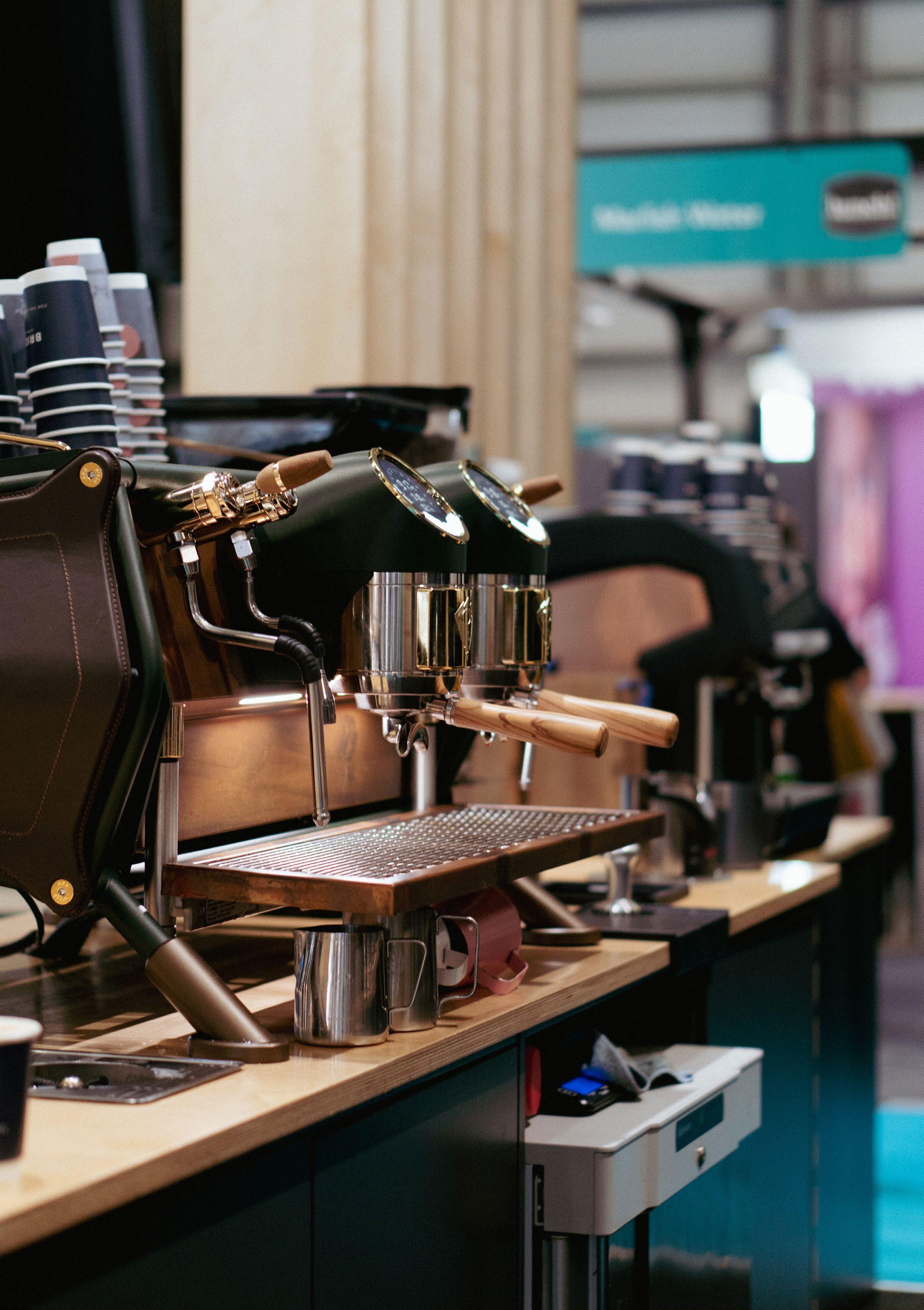
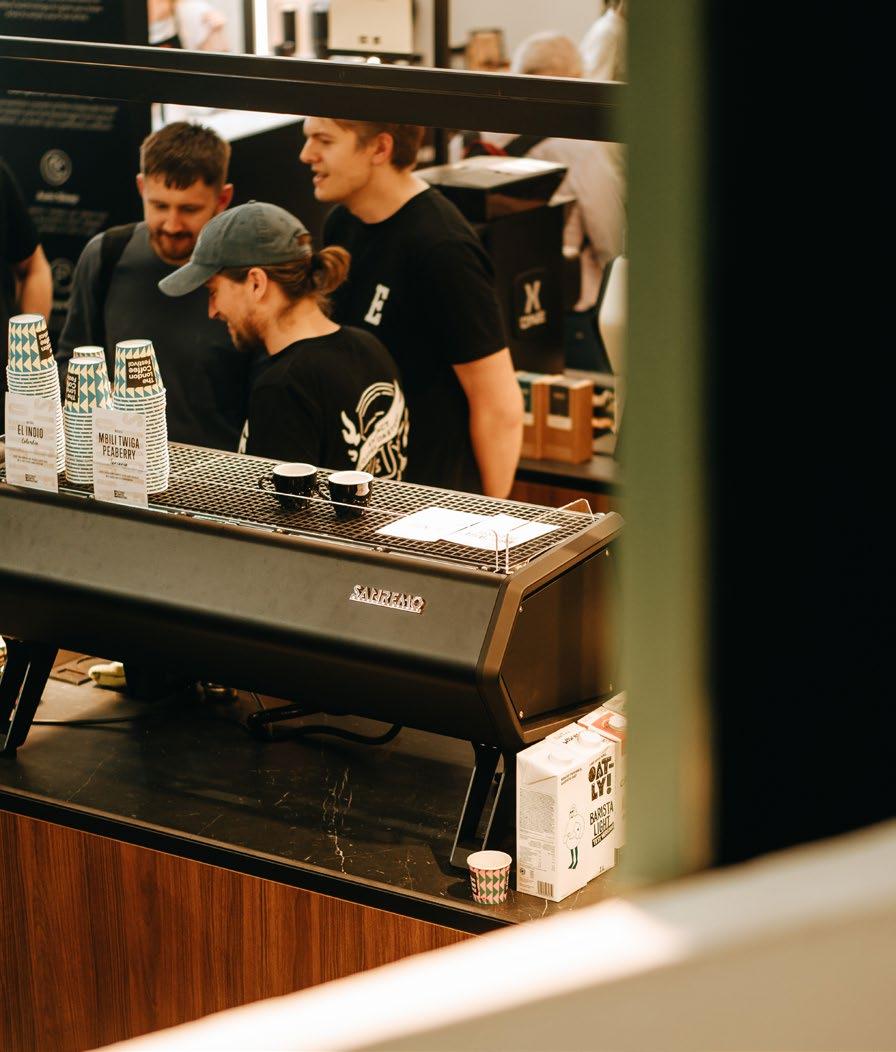
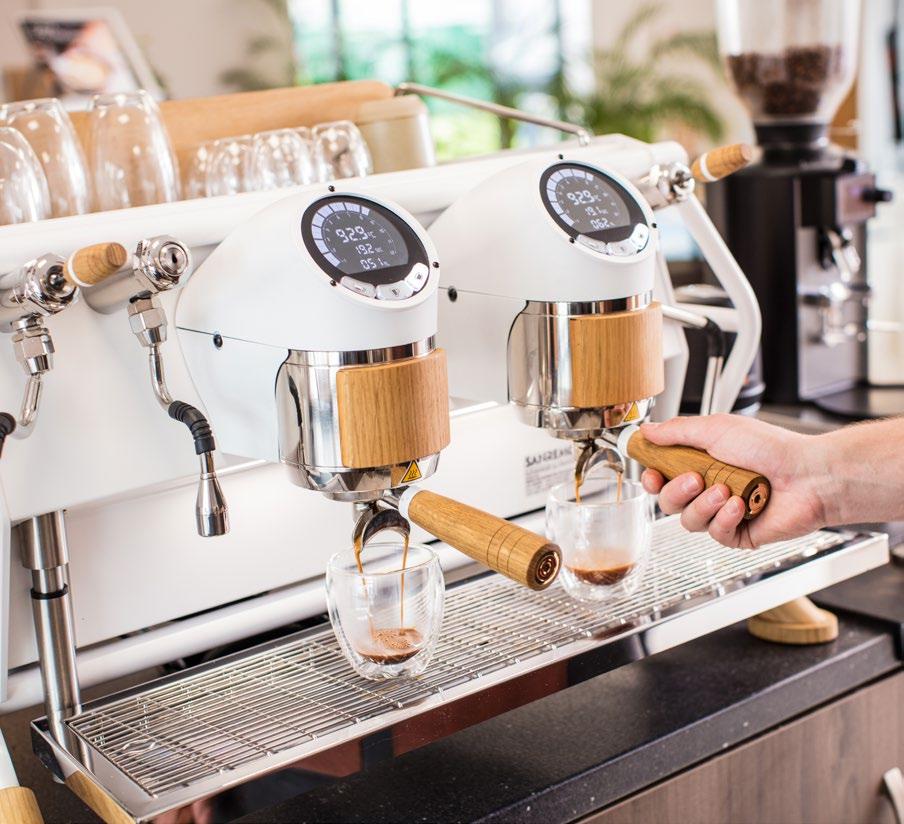
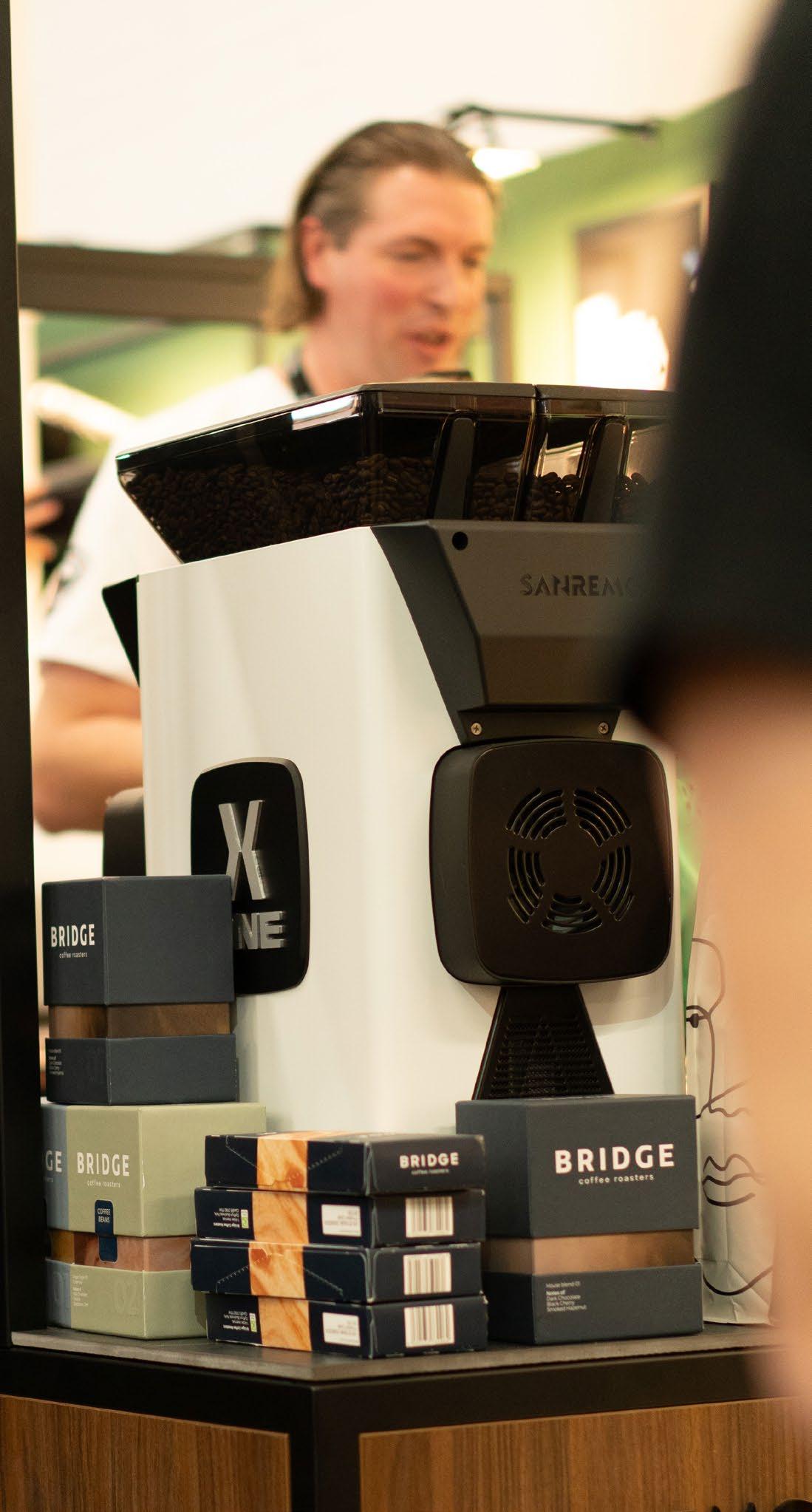
We’ve mentioned how choosing the right coffee equipment can have a significant impact on your business, and that by making the right decision you can serve better coffee, please your customers, and make more money from coffee all at the same time.
To show what a difference machinery can make, below are a few examples of businesses we have worked with to get closer to their commercial and operational goals by helping them select machinery tailored to their customer preferences and business objectives.

By upgrading their espresso machines across 96 sites, Prezzo started saving thousands each year on energy savings alone.
Members of the Food & Beverage and Catering teams at Prezzo were struggling with making a decision on their new coffee equipment. They stressed the importance of reducing running costs across their 96 sites, with a real focus on sustainability and improving energy efficiency.
This immediately stood out to us as a key deciding factor for which coffee machines to put forward to them, as energy efficiency can vary drastically across different types of machines.
Prezzo were using old La Marzocco espresso machines that needed replacing. We knew that there was a big opportunity to reduce costs and improve efficiency by recommending more modern, single boiler espresso machines that use significantly less energy than larger multi-boiler machines.
By recommending that Prezzo install Sanremo Zoe espresso machines, insulated single boiler machines with fantastic energy efficiency, Prezzo is now saving significantly on their operational costs by reducing their energy consumption whilst also serving a higher quality Italian-style coffee that delights their customers.
View the machine - The Sanremo ZOE
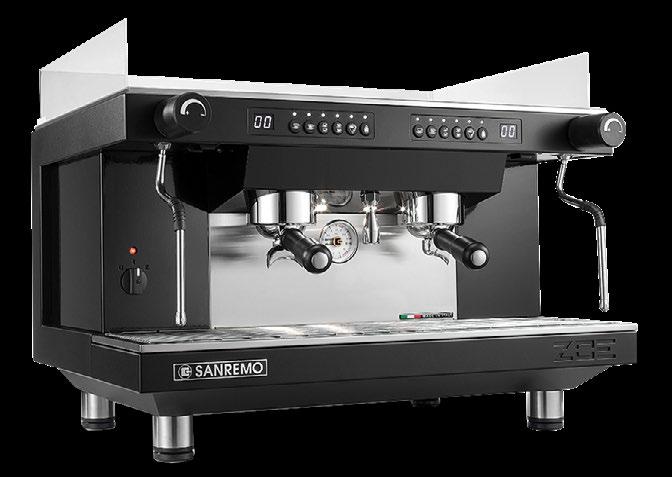


A luxury collection of 4* and 5* hotels upgraded their machinery to redefine what a premium hotel coffee experience could be.
Andrew Brownsword Hotels is a collection of luxury hotels in the UK, renowned for high standards of hospitality, dining experiences, and a focus on delivering quality to guests.
The hotel group struggled with a coffee offering that did not live up to their luxury brand experienceusing 20 year old coffee machines that were severely lacking in quality, struggling significantly with staff training and turnover, and coffees often being sent back to the kitchen.
After our consultation, the hotel group decided they wanted a barista-crafted coffee experience to be at the heart of their operation - going against the hotel industry norm of a bean-to-cup or filter coffee offering. They ultimately decided on Sanremo F18 Multi-boiler espresso machines for their design, energy efficiency and high level of capacity to keep up with their busiest periods.
Highlighting the potential issues with a traditional espresso machine setup in staff training and retention, Brownsword signed up to a rigorous barista training plan to keep coffee quality at a consistently high level across the group. The addition of PUQPress automatic tampers were also a game-changer for their workflow, speed and consistency.
The new machines and investment in an ongoing training plan vastly improved coffee quality across every hotel within the group, service speed, consistency, and customer satisfaction. Every coffee ordered within the hotel group is now hand-crafted by a well-trained barista on a traditional espresso machine.
As a result, the hotels are seeing fewer complaints and have created a coffee offering that finally aligns with their premium brand experience.
View the machine - Sanremo F18 Multi-Boiler
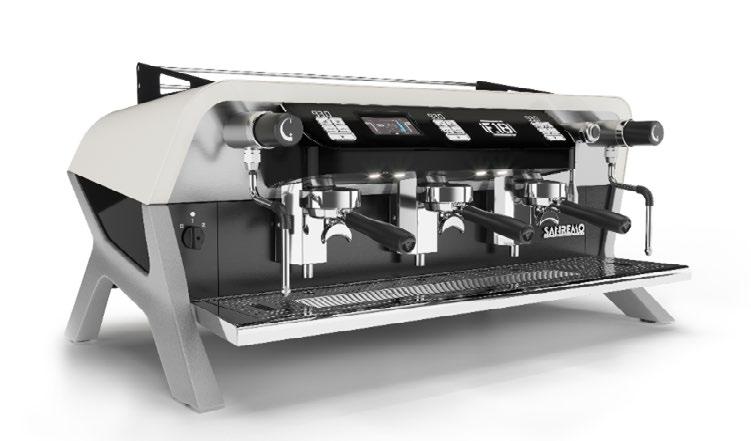
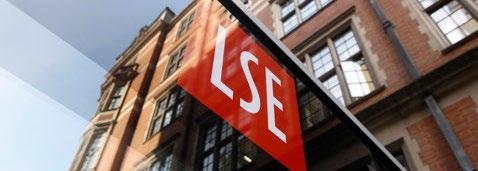

One of the world’s leading universities in social science ended their struggle with losing footfall to nearby independent specialty cafes.
Being a city university, LSE were pushed to search for an upgraded coffee service after noticing they were beginning to lose a significant portion of footfall to nearby independent coffee shops. With so much choice on their doorstep and a low quality of coffee offered by the university itself, students preferred to venture elsewhere for a tastier caffeine fix.
LSE’s coffee machines were not helping: low quality bean-to-cup coffee machines using granulated milk that offered little recipe customisation and produced a low quality of coffee. During our consultation, it was clear that a bean-to-cup machine was the right choice for their staff, but that a significant upgrade to their machinery was required.
In response to declining student satisfaction and a loss of spend to high street and independent coffee shops, the university upgraded to Schaerer Soul 10 machines with twin milk systems across their four coffee outlets.
Staying within the category of bean-to-cup machines made for a seamless switch for their staff with minimal training required, and the upgrade to a twin fresh milk system greatly improved drink quality whilst allowing alternative milks for the first time.
This upgrade significantly improved the quality of the coffee served on campus, expanded their offering to include alternative milk options and capture a wider segment of the market, and increased the overall capacity to handle higher demand.
View the machine - Schaerer Soul 10
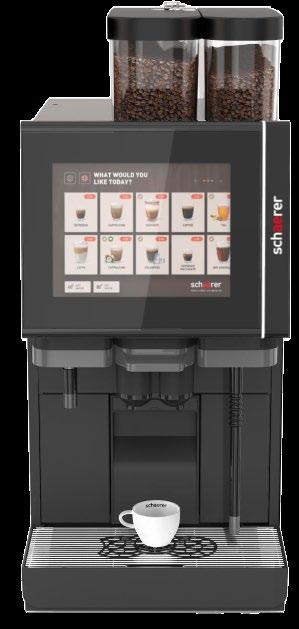
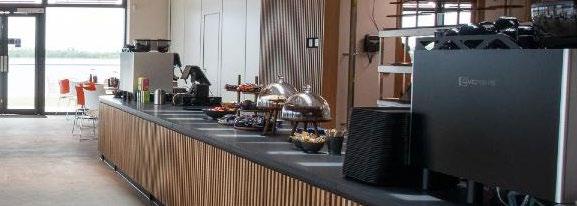
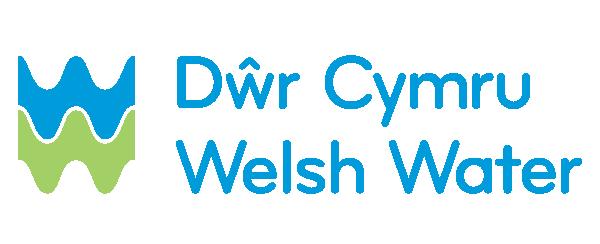
A brand new visitor attraction serves high volumes of specialty coffee thanks to their investment into coffee automation.
The not-for-profit water company began work in January 2022 for a new two-storey visitor hub for its two Victorian reservoirs in north Cardiff.
The visitor centre features changing rooms, showers and toilets for watersports, training rooms for the local community to use, as well as a café with spectacular views across both reservoirs. The visitor hub facilitates regular visits from walkers and families along with acting as a venue for large events and group sessions.
During discussions with our team, it was clear that the outlet had a number of requirements for their coffee machine. With high volumes during peak times, the visitor hub needed coffee machinery that could keep up in terms of both speed and capacity.
Welsh Water also expressed preference for a low maintenance coffee solution that required little upkeep and staff training.
Budget was allocated to invest in 3 Eversys E’4 X Wide super automatic espresso machines - a significant investment for the visitor attraction. These machines were chosen due to their industry leading automation, but importantly their capacity for up to 350 espressos per hour to handle the busy periods.
With its ETC automated extraction system, the E4 machines take on all responsibility for monitoring the coffee recipe allowing all staff members to serve delicious coffees with minimal training.
Its automatic cleaning cycles, maintenance features and an ongoing service plan ensures the machines are kept in top condition and reduces impact to service by reducing downtime.
The visitor hub is now allowing all staff to serve barista-quality coffees during even the busiest periods thanks to their investment into automation and premium machinery.
View the machine - Eversys E4 E Wide
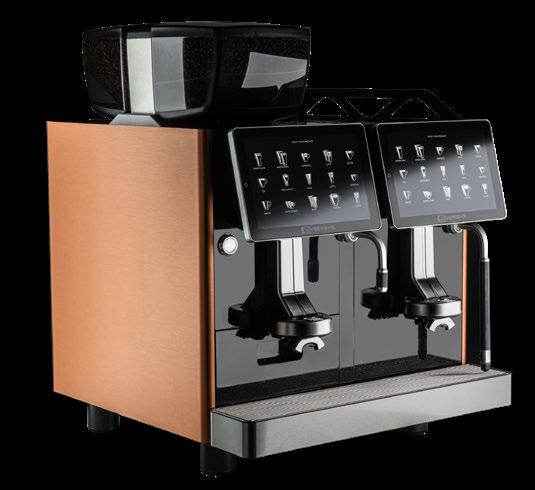
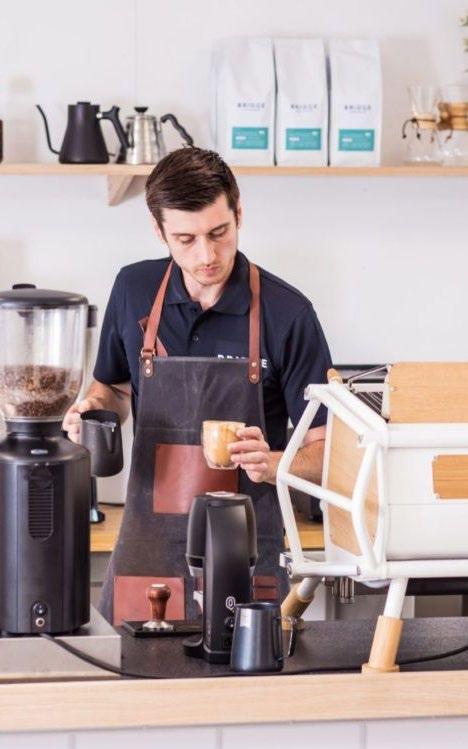
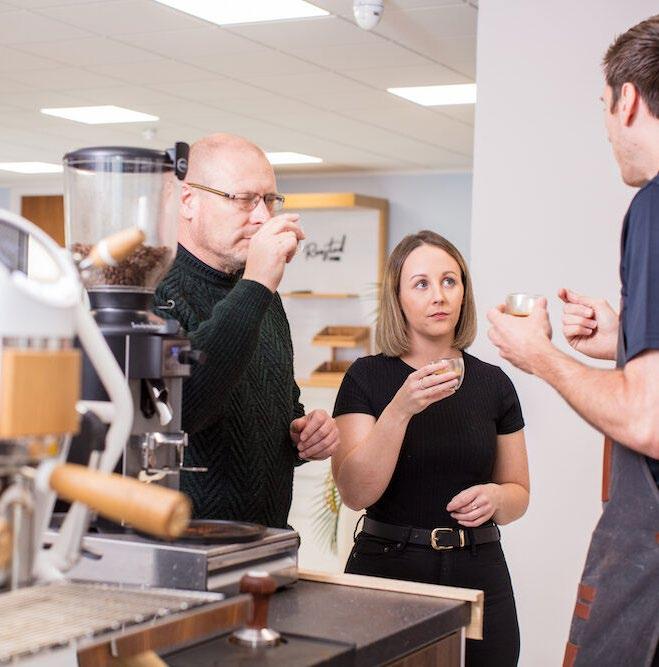
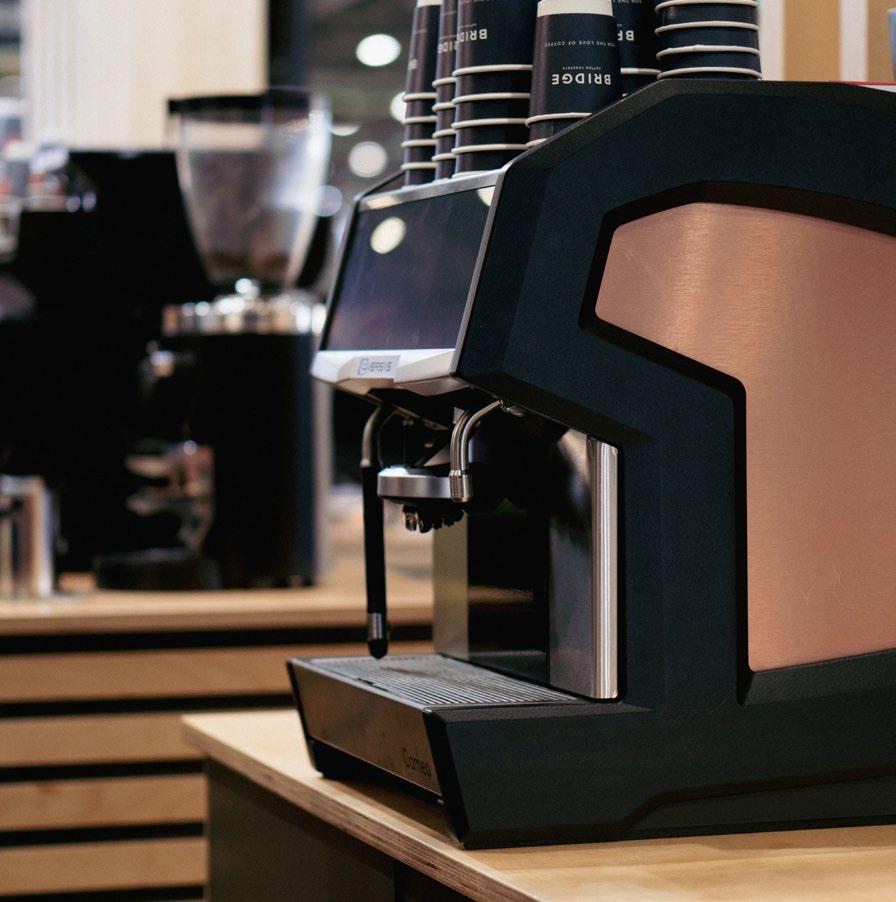
Since 1985, we have helped hundreds of businesses and professionals like you choose the right coffee machine for their needs.
We know how important it is to get the right tools for the job, and how easy it can be to overspend on features you won’t be using, or to cheap out on an affordable machine that won’t be able to keep up.
We are always looking to set our customers on the right course from day one, as the more commercially successful our customers can be, the more coffee we sell! It’s in our best interest to ensure you’re investing in coffee equipment tailored to your needs.
So, if you’re still unsure of which coffee machine could be right for you and your needs after having read this guide, don’t hesitate to get in touch with the team of experts at Bridge Coffee Roasters.
Contact Us
